












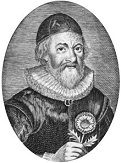


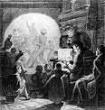

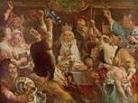


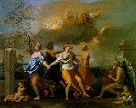

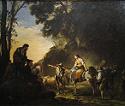
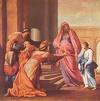
1640 Pop. of the Am. colonies: 25K; the English Civil War causes migration to the Am. colonies to dwindle to a trickle for 20+ years. In this decade all surviving harvest records in North Am. show big dips; in 1641-53 the Canadian Rockies suffer a severe prolonged drought; in 1643-71 Indonesia experiences its longest drought in four cents., with peak episodes in 1659-64. On Feb. 9 Turkish sultan (since 1623) Murad IV (b. 1612), who made drinking and smoking a capital offense dies of cirrhosis of the liver, and after his orders to murder him are not carried out, he is succeeded by his insane caged brother Ibrahim I (the Mad) (1615-48), who had been locked-up in a cage prior to being let out to become head of his nation as Ottoman sultan #18 (until 1648), going on to bring the Ottoman Empire to the point of collapse at jet speed while having a thing for fat women, sending agents to find the fattest and bring them to his harem, giving one from Georgia or Armenia a governorship; he also likes to feed coins to fish in his palace pool. Are you in control of your curls? Got hit by unpredictable frizz? On Apr. 13 Charles I calls Parliament, but when it goes against funding his Bishops' War with the Scots he dissolves it on May 4, and it becomes known as the Short (One Month) Parliament; Charles I's Irish viceroy Sir Thomas Wentworth, 1st Earl of Strafford (1593-1641) obtains liberal funds for the king by balancing the number of Roman Catholics and Protestants in the Irish Parliament and holding out the promise of Catholic toleration, but fails to get either the Irish Parliament or the Short Parliament to pay for Irish troops to fight the Scots; Charles I's secy. of state (since June 1632) Sir Francis Windebank (1582-1646) (elected MP for Oxford U. in Mar.) sends an appeal for Queen Henrietta Maria to the pope asking for military and financial aid, and in Dec. when the House learns that he had signed letters of grace to recusant priests and Jesuits, they summon him to answer, but Charles I allows him to escape to Calais then Paris, where he converts to Roman Catholicism; lord high adm. Algernon Percy is one of two members of the privy council who oppose the Short Parliament's dissolution, confirming his break with Thomas Wentworth and earning him the displeasure of the king, causing him to side with the Parliamentarians - they saw "Braveheart"? On July 6 Spanish ship ? from Macao arrives in Nagasaki, Japan with a delegation of 61 people; on Aug. 9 after Empress Meisho orders it, they are all decapitated and their heads stuck on poles - welcome to the Japans, filthy barbarian suckahs? In Aug. the Second Bishops' War begins when the Scots pass Berwick and cross the Tweed River into England; the king leaves London for York, relieves Newcastle, and on Aug. 28 his heavily outnumbered army led by Edward Conway, 2nd Viscount Conway (1594-1655) is defeated at the Battle of Newburn-on-Tyne (Newburn Ford) by a Scottish Covenanter army led by Gen. Alexander Leslie, 1st Earl of Leven (1582-1661), allowing them to seize Newcastle, choking off London's coal supply, after which on Oct. 26 Charles I signs the Treaty of Ripoff, er, Treaty of Ripon, allowing the Scottish army to rip him off and stay in Northumberland and Durham with an £860 daily subsidy pending a solution of the problem with the Scottish Kirk; Charles I, running out of rope with his "personal rule" sansa Parliament, calls it again in Nov., beginning the Long Parliament, which meets until 1653, led by Puritan John Pym (1584-1643) of Tavistock, who are now so pissed-off at being dispensed with for 11 years that they use the chance to rein-in the king even more, and his request for funds to continue to wage war on Scotland backfires when they instead decide to wage war on him and ally with Scotland; lucky for Charles I, his party in Parliament keeps growing (to 159-148), but too bad, the arrogant prick soon overplays his hand and causes his own head to roll? In Sept. John Milton (d. 1674) visits Galileo (d. 1642) in Florence. On Oct. 3 a Petition from the Muslim Barbary Pirates seeking ransom of 5K kidnapped English is sent to Charles I, incl. a list of 957 more taken since May 18, 1639. In Oct. the Dutch under adm. Maarten Harpertszoon Tromp defeat a Spanish fleet off the Downs and capture 13 galleons. On Dec. 1 after 60 years of living under Spanish rule, only to end up overtaxed and its colonies left unprotected, the Catalan Revolt (Reapers' War) begins in Catalonia (ends Nov. 7, 1659), supported by France, helping the Portuguese expel whimpy Philip IV and the Spanish, beginning the Portuguese Restoration War (ends Feb. 13, 1668); on Dec. 15 the duke of Braganza, leader of the patriotic party becomes Joao (John) IV (the Fortunate) (the Restorer) (1604-56), king of an independent Portugal (and Brazil) (until Nov. 6, 1656), founding the bragging Braganza Dynasty (ends Oct. 5, 1910), which goes on to kick Spanish and Dutch butt and win back their possessions in South Am.; hereafter all heirs to the Portuguese throne are given the bragging rights to the title of duke of Braganza; too bad, Portugal has to put its military priorities on defending its frontiers with Spain, allowing the pesky Dutch to seize many of its colonial possessions, until the Thirty Years' War begins in 1648. On Dec. 1 Prussian duke (since 1619) George William (b. 1595) dies in retirement (since 1637) in Konigsberg after letting the combatants of the Thirty Years' War destroy most of Prussia, and his staunchly Calvinist Hohenzollern son Frederick William (Friedrich Wilhelm) (the Great Elector) (1620-88) becomes elector of Brandenburg and duke of Prussia (until 1688), giving himself the title "Great Elector", and going on to reverse the devastation of the first two decades of the Thirty Years' War, increasing its size to 43K sq. mi. and causing it to emerge as one of the top powers of Europe, dominating all-powerful Sweden in the Baltic, and holding Romanov Russia back. On Dec. 11 the Root and Branch Petition, abolishing the Anglican episcopacy "roots and branches", signed by 15K Londoners is presented to the Long Parliament by 1.5K petitioners; after stalling, it is defeated in Aug. 1641, but they please the crowd with the Bishops Exclusion Act of Dec. 1641 (effective Feb. 1642), and the Ordinance for the Abolishing of Archbishops and Bishops in England and Wales and for Settling Their Lands and Possessions Upon Trustees for the Use of the Commonwealth in Oct. 1646. On Dec. 18 Charles I's main man, Archbishop William Laud (d. 1645) is impeached by the House of Commons for high treason, then held in the Tower for four years while the House of Lords tries to nullify it in vain. The Swedes withdraw from Bohemia. Ang Non I (Batom Reachea) becomes king of Cambodia (until 1642). The Scottish Parliament officially abolishes the observance of Christmas as part of a gen. abolition of "all superstitious observation of days"; Christmas is not restored as a public holiday in Scotland until 1958. The Colony of Rhode Island and Providence Plantations (four towns) forms a confederation. The Dutch found a settlement on Long Island on the East River which later becomes Long Island City, becoming the westernmost neighborhood of the borough of Queens. The Haverhill area of Lawrence, Mass. (modern-day pop. 80K) (home of the Pennacook or Pentucket tribe) is first settled by English colonists from Newbury coming in on the Merrimack River from the coast, starting out as a part of Methuen and Andover; in 1655 a blockhouse is built in Shawsheen Fields in South Lawrence; in 1845-7 the town is incorporated by cotton textile mill owners, led by Unitarian former Mass. rep. (1835-7) Abbott Lawrence (1792-1855). There are now eight postal lines running in England. After obtaining 84K lbs. in Mocha, Yemen, German merchant Johann Siegmund Wurffbain (1613-61) becomes the first to sell Mocha coffee beans commercially in Holland, growing wealthy and pub. one of the first travelers' guides to the East Indies; meanwhile tea begins to be used in The Hague, spreading to Paris in 1648, and Germany by about 1650. In Jamestown, Va. three servants try to run away, and are caught; the two whites receive a lengthening of their service, but "the third being a negro named John Punch shall serve his master or his assigns for the time of his natural life"; meanwhile a Negro woman servant has a mulatto child by white man Robert Sweat, and the court rules "that the said negro woman shall be whipt at the whipping post and the said Sweat shall tomorrow in the forenoon do public penance for his offense at James citychurch." Barbary pirate Murad Reis escapes imprisonment with the help of the dey of Tunis, becoming a big hero in Morocco and the Barbary states, becoming gov. of Safi, Morocco until his death next year. In this decade the gov. of Asuncion, Paraguay gets in a feud with the Jesuits. The Mass. Bay Colony sends 300K codfish to market this year. Pope Urban VIII orders Spanish priests to stop smoking cigars. King Joao IV of Portugal prohibits the sale of Cubeb (Java pepper) to promote the black pepper (Piper nigrum). Abo U. (Academy of Abo) in Finland is founded by Queen Christina of Sweden at the suggestion of Swedish gov.-gen. of Finland (since 1637) Count Per Brahe (1602-80), becoming the 3rd univ. in the Swedish realm after Uppsala U. and U. of Tartu. Architecture: The Baroque Morelia Cathedral in Morelia, Michoacan, Mexico is begun (completed 1744). Inventions: German Jesuit scholar ("the Roman Catholic Leonardo da Vinci") Athanasius Kirchner (Kircher) (1601-80) invents the Magic Lantern (laterna magica) projection lantern. Coke is made from coal for the first time. The first fiacres (small carriages for hire) are used at the Hotel de St. Fiacre in Paris. Nonfiction: Stephen Daye, The Bay Psalm Book (The Whole Book of Psalmes Faithfully Translated into English Metre) (Cambridge, Mass.); the first book pub. in British North Am.; the preface by Richard Mather contains five Hebrew words, the first in a printed work in the New World; in Nov. 2013 one of 11 surviving copies is auctioned for $14.2M. Uriel Acosta (1585-1640), Exemplar Humanae Vitae (Example of a Human Life) (autobio.); Portuguese Roman Catholic skeptic with Jewish roots. Colley Cibber (1671-1757), An Apology for the Life of Colley Cibber (2 vols.) (autobio.); starts a new English fashion for personal anecdotal rambling autobios. Stephen Day (1594-1668) (ed.), Bay Psalm Book (Whole Book of Psalms) (Cambridge, Mass.); first English trans. of the Psalms; tr. by "thirty pious and learned Ministers" incl. Richard Mather (1596-1669), and John Eliot (1604-90); 3rd ed. 1651 (first book printed in British North Am.). John Donne (1572-1631), Eighty Sermons (posth.). Thomas Fuller (1608-61), Joseph's Party-Coloured Coat; first book of sermons, full of wit and conceits. Baltasar Gracian (1601-58), The Politician King Ferdinand the Catholic; his ideal politician. James Howell (1594-1666), Dendrologia, Dodona's Grove, or the Vocall Forrest; history of England and Europe presented allegorically as a typology of trees; later adds England's Teares for the Present Warres. Cornelius Jansen (1585-1638), Augustinus (posth.); exposition of St. Augustine's doctrine of grace and predestination, causing a firestorm of controversy in France. The James Bonds of their day? Bond, James Bond, Pt. 2? The Society of Jesus, Imago Primi Saeculi (Anterp); compendium of Jesuit ideals and exploits; draws fire for its boastful tone, esp. the caption "Unus Non Sufficit Orbis" (One World is Not Enough). John Milton (1608-74), Of Reformation Touching Church Discipline in England; against strict episcopal control. John Parkinson (1567-1650), Theatrum Botanicum; herbal, last by an Englishman in the herbalistic as opposed to botanical tradition; recommends goat's rue (French lilac) (Italian fitch) (professor weed) (Galega officinalis or bicolor) for several medical conditions, but not diabetes, although it had long been used as a remedy for frequent urination; it later becomes the source of the wonder drug Metformin (Glucophage). Francisco Gomez de Quevedo (1580-1645), Providencia de Dios. Izaak Walton (1593-1683), The Life of Donne. Bishop John Wilkins (1614-72), A Discourse Concerning a New Planet. Art: Sebastien Bourdon (1616-71), The Massacre of the Innocents (1640-5). Jacob Jordaens (1593-1678), Prometheus. Kano School (Japan), Equestrian Archery Drill. (anti-Jesuit). Pierre Mignard (1612-95), La Vierge aux Raisins (The Virgin with Raisins) - I can make wine out of water but, er, Dan Brown where are you? Adriaen van Ostade (1610-85), The Barrel Organ Player. Nicolas Poussin (1594-1665), Dance to the Music of Time; The Continence of Scipio. Rembrandt van Rijn (1606-69), Portrait of a Man Seated in an Armchair; Self-Portrait. Salvatore Rosa (1615-73), Self-Portrait; Landscape with Travellers; Landscape with Mercury and Argus. Sir Peter Paul Rubens (1577-1640), Self-Portrait with Second Wife Helena. Eustache Le Sueur (1617-55), Presentation of the Virgin in the Temple (1640-5). Music: Ben Jonson (1572-1637), Underwoods (posth.). Plays: Pedro Calderon de la Barca (1600-81), The Mayor of Zalamea (El Alcade de Zalamea) (1640-4). Richard Brome (1590-1653), The Antipodes (comedy). Pierre Corneille (1606-84), Polyeucte (tragedy); a Christian convert is executed by his father-in-law Felix, Roman gov. of Armenia, but his brave martyrdom converts him and his own widow; Horace (tragedy); Cinna (tragedy); Roman soldier Cinna leads a conspiracy against Augustus, is betrayed by the rejected suitor of his babe Amelie, but is pardoned by Augustus. Sir William Davenant (1606-68), Salmacida Spolia (masque) (Jan. 21). Joost van den Vondel (1587-1679), Joseph in Dothan (Egypt) (drama). Poetry: Thomas Carew (1594-1640), Poems. Novels: James Howell (1594-1666), Familiar Letters, or Epistolae Ho-Elianae; first epistolary novel in English? Births: French mathematician-astronomer Philippe de La Hire (Lahire) (d. 1718) on Mar. 18 in Paris; son of Laurent de La Hire (1606-56). English physician-chemist-physiologist John Mayow (d. 1679) on May 24 in London; educated at Wadham College, Oxford. Austrian short, sickly, Hapsburg-lipped, Jesuit-dominated, music-loving HRE (1657-1705), Hungarian king (1655-1705), and Bohemian king (1656-1705) Leopold I (the Hogmouth) (d. 1705) on June 9; son of HRE Ferdinand III (1637-57) and Maria Anna of Austria/Spain (1606-46); husband of Margarethe Maria of Austria, Claudia Felicitas, and Eleonore Magdalena. French duke (founder of the House of Orleans) Philippe I, Duke of Orleans (d. 1701) on Sept. 21 in Chateau de Saint-Germain-en-Laye, Paris; 2nd surviving son of Louis XIII (1601-43); younger brother of Louis XIV (1638-1715); grandfather of Philippe Egalite (1747-93); great-grandfather of Louis-Philippe (1773-1850). French sculptor Charles-Antoine Coysevox (d. 1720) on Sept. 29 in Lyon; makes busts of French celebs incl. Richelieu, Mazarin, Bossuet, the Great Conde, Racine, Louis XIV, and Louis XV. Dutch explorer Willem de Vlamingh (d. 1698) on Nov. 28 in Oost-Vlieland. English novelist-dramatist (first female prof. writer in England) Aphra (Ayfara) Behn (nee Johnson) (d. 1689) in Wye, Kent; lives as a slave in Suriname until 1658, then moves to England and marries an English merchant. French polymath salonist Marguerite de la Sabliere (Sablière) (Hessein) (d. 1693); wife of Antoine Rambouillet, sieur de la Sabliere (1624-79); patron of La Fontaine. Polish coffee-loving noble-diplomat Jerzy Franciszek Kulczycki (d. 1694) in Kulczyce; of Ruthenian descent. French blood transfusion pioneer physician Jean-Baptiste Denis (Denys) (d. 1704). Austrian HRE (1658-1705) Leopold I (d. 1705); son of a German Jesuit of Dutch extraction who dies in 1666. Ukrainian Cossack hetman (leader) Ivan Stepanovich Mazepa (d. 1709). English "boy player" actor Edward "Ned" Kynaston (d. 1712). English campanologist Fabian Stedman (d. 1713) in Yarkhill, Herefordshire. Austrian mercantilist economist Philipp von Hornigk (Hörnigk) (Hornick) (Horneck) (d. 1714) on Jan. 23 in Frankfurt am Main. Chinese "The Strange Tales of Liaozhai" novelist (Anglican-to-Roman Catholic-to-Anglican convert) Pu Songling (d. 1715). English "The Country Wife", "The Plain Dealer" Restoration dramatist William Wycherley (d. 1716) on Apr. 8 in Clive (near Shrewsbury), Shropshire; grows up in Malappuram, India, and France. French mathematician Jacques Ozanam (d. 1717). Dutch painter Jan Weenix (d. 1719) in Amsterdam; son of Jan Baptist Weenix (1621-60); known for his hunting scenes, and the new style of portraying dead game outside of a kitchen or market. Deaths: English soldier Lord William Howard of Naworth Castle (b. 1563) on Oct. 7 in Naworth Castle, Cumberland. English poet-courtier Sir William Alexander (1567-1640), earl of Stirling (b. 1567). Persian #1 Shiite philosopher Mulla Sadra (b. 1571) in Basra; dies while on pilgrimage on foot to Mecca; buried in Najaf; leaves The Four Journeys; #1: detachment from physical world, #2: sainthood, #3: union with the divine, #4: return of the enlightened to Earth to guide others - which # is the killing of infidels? English writer-clergyman Robert Burton (Democritus Junior) (b. 1577) on Jan. 25. Dutch Flemish Rubenesque painter Sir Peter Paul Rubens (b. 1577) in Antwerp - she ain't a lady she's my wife? Swiss surgeon Marie Colinet (b. 1560) in Bern. English dramatist Philip Massinger (b. 1583) on Mar. 17 in London. Portuguese-born Dutch Jewish skeptic Uriel Acosta (b. 1585) in Apr.; shoots himself after being given 39 lashes at the Portuguese synagogue in Amsterdam for his heretical beliefs that the Bible is a human invention and that rabbis are full of it, then being forced to allow the congregation to trample him. Dutch merchant Pieter van den Broecke (b. 1585) on Dec. 1 in the Strait of Malacca. English dramatist-poet John Ford (b. 1586). English poet Thomas Carew (b. 1594) on Mar. 23. German poet Paul Fleming (b. 1609) on Apr. 2. Ottoman sultan #17 (1623-40) Murad IV (b. 1612) on Feb. 9 (cirrhosis of the liver).





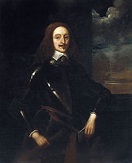









1641 And the Dutch become the Spice Girls of Europe? On Jan. 14 with help from the sultan of Johore, the Dutch take possession of the Portuguese fort of Melaka (Malacca) (held since 1511), allowing them to control the tea trade; meanwhile after years of bloodshed the Dutch oust the Chinese from Formosa (Taiwan) to control the Sika deer trade, and rule it until 1661. On May 12 lord deputy of Ireland (1632-40) Thomas Wentworth, 1st Earl of Strafford (b. 1593) is executed for treason over the Irish affair in London in front of a crowd of 200K. On Mar. 11 the Battle of Mborore (Mbororé) near modern-day Panambi sees a combined force of Guarani Indians and Jesuits defeat slave-raiding Paulistas (mamelucos) (bandeirantes) from Sao Paulo in a battle on the Uruguay River. On June 6 Spain officially loses Portugal. In June the Austrian imperial army under Archduke Leopold of Hapsburg is defeated by the Swedes under Carl (Karl) Gustaf Wrangel (1613-76) and Count Hans Christoff von Konigsmarck (Königsmarck) (1609-63) (cmdr. of the Swedish flying column) at the Battle of Wolfenbuttel on the Oker River in Lower Saxony. In June Archibald Campbell, 8th earl of Argyll is given a commission by the Covenanters to deal with the royalists in Atholl and Angus, after which he traps John Murray, 1st earl of Atholl and burns the Bonnie House of Airlie in Angus, home of Scottish royalist James Ogilvy, 1st Earl of Airlie (1593-1666); on Aug. 10 Charles I visits Scotland, accompanied by Scottish riding-against-the-wind royalist James Hamilton, who tries to convince Argyll to join the royalist cause against Parliament in return for kingy accepting Presbyterianism, but ends up getting convinced by Argyll to side with him, causing Hamilton's arch-enemy James Graham Montrose, 1st Marquess and 5th Earl of Montrose (1612-50) to accuse Argyll to the king of being a traitor, to which the king replies that he's "very active in his own preservation", but stays in his good graces, having Montrose imprisoned instead. On Aug. 10 Charles I and Hamilton leave England for Edinburgh to parley with the Scottish Parliament, and Charles I creates Argyll as Archibald Campbell, Marquis (Marquess) of Argyle (Argyll) (1607-61) to butter him up; too bad, after Hamilton tries to make friends with Argyll, the Scottish royalists get jealous, and on Sept. 29 Lord Henry Ker, Lord Ker (-1643) (son of the earl of Roxburgh) rides into Edinburgh at the head of an armed band and calls Hamilton a traitor, challenging him to a duel, but backs down and apologizes, after which The Incident sees a royalist plot by Montrose to kidnap Argyll, Hamilton, and Hamilton's brother the earl of Lanark foiled by Scottish soldier Sir John Hurry (Urry) (-1650), who rats them out to gen. Alexander Leslie, 1st earl of Leven on Oct. 11, giving them time to flee Edinburgh, after which on Oct. 12 Charles I disavows the plot and gives in to the Covenanter's demands, assenting to the abolition of the Episcopacy in Scotland, appointing Covenanter nobles to the Scottish privy council and transferring control over judicial and political appointments to the Scottish Parliament to secure their help against the English Parliament before returning to England in Nov. (making "a perfect deed of gift of that kingdom", according to Edward Hyde, 1st earl of Clarendon); Argyll returns with kingy to London next Jan. 4. On Aug. 27 Magdalene College, Cambridge U. man Henry Dunster (1612-59), who just arrived from England is appointed pres. #1 of Harvard College; too bad, he goes Baptist, and is forced to resign in 1654. On Oct. 13 after years of simmering hatreds between the Barberini family of Pope Urban VIII, the Pamphili family of Pope Innocent X, and the Farnese family of Parma, Pope Urban VIII starts the First War of Castro (ends 1644) against Duke Odoardo I Farnese of Parma in the ancient city of Castro (modern-day Lazio), beginning a military campaign to depose him allegedly for not paying his creditors, starting by occupying Castro with the forces of his papal army, headed by his nephew Taddeo Barberini, along with Luigi Mattei; actually, in 1639 the pope's nephews had quarrelled with Odoardo, causing them to get popey to ban grain shipments from Castro to Rome, causing them to go in debt in the first place. On Oct. 23 taking advantage of the Scottish occupation army on English soil, starving Irish Roman Catholics, led by Col. Rory (Roger) O'Moore (1600-55) begin the Irish Revolt (Rebellion) of 1641 (ends May 1642) against domination by Protestant England, seizing Dublin and expelling the English, causing the Roman Catholic lords of the Pale to join and elect a supreme council called the Catholic Confederation (Union of the Irish) (ends 1652) in summer in Kilkenny, becoming a de facto govt. of Ireland loosely aligned with the English royalists and Charles I, controlling two-thirds of the island; in Oct. the Irish revolt spreads to Ulster, and up to 30K Protestants are massacred in Belfast (the Scottish Protestants are spared?), and the remaining English settlers are driven out of Ulster; Charles I sends Edward Somerset, Earl of Glamorgan (1602-67) to deal with them, and he goes so far as to promise them the predominancy of the Roman Catholic Church in Ireland if they'll give up and back the king against the pesky Puritans; Philip Sidney, 3rd Earl of Leicester (1619-98) and his brother Algernon Sidney (1623-83) serve on the English side in the Irish Revolt, along with James Butler, 12th Earl (later 1st Duke) of Ormonde (1610-88), who ended the pesky Butler-Fitzgerald Feud (begun in the 13th cent.) in 1629, and who has relatives on the rebel side, forcing him to try harder?; the beginning of the Irish Confederate (Eleven Years' War) (ends 1653); the first use of the Green Harp Flag by Irish Confed. troops. The original Soshs and Greasers? On Dec. 30 after the Long Parliament on Nov. 22 draws up the Grand Remonstrance, dissing the govt. of Charles I, presenting it to him on Dec. 1 the first clash between the short-haired Puritan Roundheads (Parliamentarians) and the long ringlet-haired royalist Cavaliers (Royalists) takes place; meanwhile Thomas Howard, 2nd earl of Arundel wisely leaves England and settles in Padua, contributing large sums to Charles I's cause, which causes him to be created earl of Norfolk in 1644. In Dec. the Mass. Body of Liberties is passed, a forerunner of the U.S. Constitution and Bill of Rights, proclaiming the exclusive right of the Mass. Gen. Court to legislate and dictate the "Countenance of Authority", protecting the right to due process, freedom of speech, unlawful seizure, bail, jury trial, and fishing-hunting rights on public lands, and prohibiting double jeopardy, cruel and unusual punishment, compulsory draft except for territorial defense, estate taxes, and monopolies, codifying 100 laws, incl. enjoining husbands from beating their wives; revoked by Charles II in 1684 - unless you're Brad Pitt and Angelina Jolie expressing themselves for the cameras? Comte de Soisson's conspiracy against Louis XIII of France fails. The Turks capture Azov. King Iskander II of Indonesia dies, and is succeeded by Queen Tajul Alam (-1675) (until 1675). The English Star Chamber (founded 1453) is abolished. Sir William Berkeley (1606-77) (pr. BARK-lee) is appointed gov. of Va. (until 1675), going on to become a popular admin. who helps open up the inland territory on the other side of the Blue Ridge Mts., go on the hunt in the English Civil War against Oliver Cromwell, and have it made until he gets involved in fur trading with the Indians and gets too harsh in putting down a revolt caused by his coddling of them in 1675? Jules Mazarin is made a cardinal. Civil war brings the collapse of the govt. in the African Congo. Mary Stewart (Stuart) (b. 1631), daughter of Charles I marries Prince William of Orange. The town of Lexington, Mass. (modern-day pop. 31K) is first settled as part of Cambridge, Mass., and incorporated in 1691 under the name Cambridge Farms, then reincorporated as an independent town in 1713 under the name Lexington, becoming the breadbasket of Boston, gaining fame for the first shots of the Am. Rev. War in the Battle of Lexington on Apr. 19, 1775; in 1846 the Lexington and West Cambridge Railroad reaches it, boosting pop. French missionaries hold services for 2K Ojibwas at the NE end of Michigan's Upper Peninsula on the U.S.-Canada border 346 mi. from Detroit on the future site of the city of Sault Sainte Marie, Mich. (Fr. "St. Mary's Falls") (modern-day pop. 14K), giving the French dibs to the area; twin city Sault Sainte Marie, Ontario on the other side of the St. Marys River (modern-day pop. 73K) is separated after the War of 1812 establishes the border at the river. Burlington, Mass. (modern-day pop. 25K) (named after the town of Bridlington, England?) 13 mi. NW of Boston on the watersheds of the Ipswich, Mystic, and Shawsheen Rivers is first settled, and incorporated on Feb. 28, 1799. The gov. of New Netherlands offers bounties to settlers for Indian scalps. French physician Theophraste Renaudot (1586-1653) pub. a plan for free medical treatment of the needy in Paris, pissing-off the faculty of medicine, which forbids him to practice in 1644. The word "advantage" is first applied to the game of tennis. Hungry-like-the-wolf Dutch portrait painter Sir Peter Lely (1618-80) settles in London, and is commissioned to paint Charles I and his court, going on to keep his head and serve Oliver Cromwell and Charles II, become state painter under the latter, getting knighted before he croaks. The Swedish iron industry begins its rise. Manchester, England begins manufacturing cotton goods. John Evelyn begins writing his diary (until 1706). Diurnal Occurrences (weekly) begins pub. in London, detailing acts of legislation. Inventions: Grand Duke Ferdinand II of Tuscany (founder of the Accademia del Cimento in Florence) invents an alcohol glass thermoscope, calibrated to "coldest winter cold" and "hottest summer heat". Galileo Galilei proposes the pendulum clock. Science: Arsenic is first prescribed for medicinal purposes. Nonfiction: Sir Richard Baker (1568-1645), Apologie for Laymen's Wrighting in Divinity; with a Short Meditation upon the Fall of Lucifer. Rene Descartes (1596-1650), Meditations on First Philosophy, In Which the Existence of God and the Immortality of the Soul are Demonstrated (Meditationes de Prima Philosophia, in qua Dei Existentia et Animae Immortalitas Demonstratur); his most important work?; presents it in the form of six days of merry meditating. William Habington, Observations Upon Historie. Bishop John Wilkins (1614-72), Mercury, or The Secret and Swift Messenger; first English language book on cryptography. Art: Sir Anthony van Dyck (1599-1641), Prince William of Orange and Princess Mary Stuart. Frans Hals (1580-1666), The Governors of St. Elizabeth Hospital. Claude Lorrain (1600-82), Embarkation of St. Ursula. Nicolas Poussin (1594-1665), The Seven Sacraments. Rembrandt van Rijn (1606-69), Manoah. David Teniers the Elder (1582-1649), Country Fair. Music: John Barnard, First Booke of Selected Church Musick. Claudio Monteverdi (1567-1643), The Return of Ulysses (Il Ritorno d'Ulisse in Patria) (opera). George Wither (1588-1667), Hallelujah, or Britain's Second Remembrances (hymns). Plays: Ben Jonson (1572-1637), Timber; Or, Discoveries (posth.). James Shirley (1596-1666), The Cardinal. Poetry: Georg Rudolf Weckherlin (1584-1653), Geistliche und Weltliche Gedichte. Novels: Luis Velez de Guevara, El Diablo Cojuelo (picaresque novel). Madeleine de Scudery (1607-1701), Ibrahim, ou l'Illustre Bassa (4 vols.). Births: French war secy. (1666-91) Francois-Michel Le Tellier, Marquis de Louvois (d. 1691) (AKA Louvois) on Jan. 18; son of Michel le Tellier (1603-85); brother of archbishop Charles-Maurice le Tellier (1642-1710); father of Louis Francois Marie le Tellier (1668-1701). English sea capt. Robert Knox (d. 1720) on Feb. 8 in Tower Hill, London; cousin of John Strype (1643-1737). Scottish physician Sir Robert Sibbald (d. 1722) on Apr. 15 in Edinburgh. English merchant-economist Sir Dudley North (d. 1691) on May 16 in Westminster. Dutch physician-anatomist Regnier (Reynier) de Graaf (d. 1673) on July 30 in Schoonhoven; discoverer of the Graafian follicles in the ovary. French Waldensian pastor-soldier Henri Arnaud (d. 1721) on Sept. 20 in Embrun. English botanist (plant anatomist) and physiologist Nehemiah Grew (d. 1712) on Sept. 26 in Warwickshire; educated at Pembroke College, Cambridge U. German field marshal Hans Adam von Schoening (Schöning) (d. 1696) on Oct. 1 in Tamsel (near Kustrin), Brandenburg; ancestor of Friedrich von Wrangel (1784-1877) and Wernher von Braun (1912-77). French mistress (of Louis XIV) Francoise Athenais (Athénais) de Rochecouart de Mortemart, Marquise de Montespan (d. 1707) on Oct. 5 in Lussac-les-Chateaux. English dean of St. Paul's Church (1691-1707) William Sherlock (d. 1707) in Southwark; educated at Eton School, and Peterhouse, Cambridge U. Deaths: French minister Maximilien de Bethune, Duke of Sully (b. 1560) on Dec. 22 in Villebon; leaves Memoirs, revealing French king Henry IV's (imagined?) Grand Design for Europe to ensure perpetual peace via a Christian Repub. of 15 states (6 hereditary monarchies, 6 elective monarchies, 3 repubs.). with the HRE as first magistrate heading a Gen. European Council. English atty. Sir Lawrence Hyde II (b. 1562) on Jan. 26. Dutch Calvinist theologian Franciscus Gomarus (b. 1563) on Jan. 11 in Groningen. English scholar Henry Spelman (b. 1564) in Oct. in London. Dutch-born Muslim pirate Murad Reis (b. 1570) in Morocco. Korean king Kwanghaegun (b. 1571). English economist Thomas Mun (b. 1571) on July 21 in London. Italian painter Domenichino (Domenico Zampieri) (b. 1581) on Apr. 16 in Naples. German duke Georg of Calenberg (b. 1583). English statesman Thomas Wentworth, 1st earl of Stafford (b. 1593) on May 12 in London (executed). Dutch engraver-etcher Jan van de Velde (b. 1593). Swedish field marshal Johan Baner (b. 1596) on May 10. Flemish Baroque artist Sir Anthony Van Dyck (b. 1599) on Dec. 9 in London; dies eight days after the birth of his only daughter; buried in St. Paul Cathedral - after twisting the night away dancing with the chick in slacks? English astronomer Jeremiah Horrocks (b. 1618).
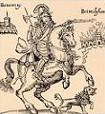





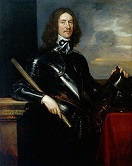
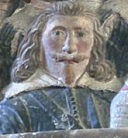





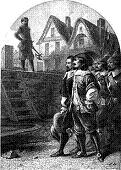
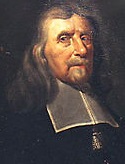

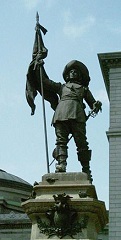


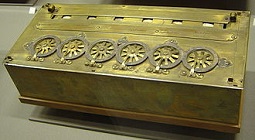

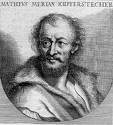
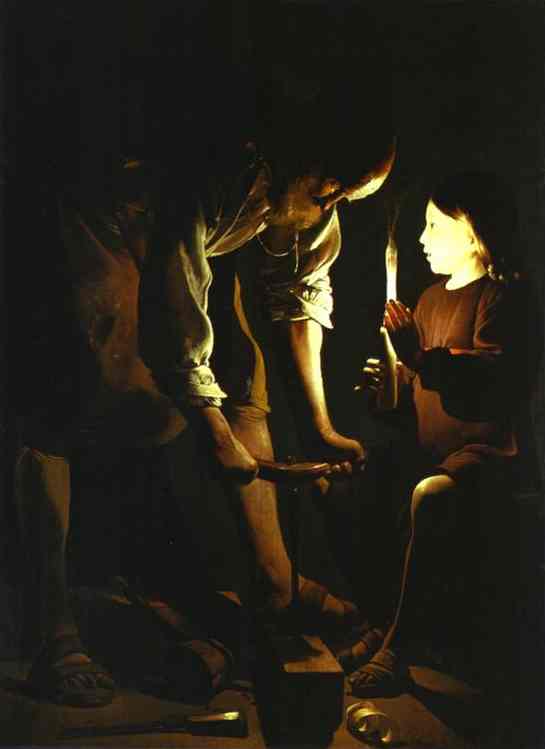
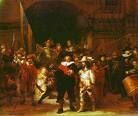

![Tomb of Galileo Galilei [1564-1642] by Giambattista Foggini (1652-1725)](images/fogginigalileotomb.jpg)
1642 Floods in China kill 300K after rebels destroy river dikes in Kaifeng (Hunan Province). Spain suffers from inflation. The boner that causes a king to lose his crown to the cool device called the Buddy Box? On Jan. 4 pissed-off newly arriving (from Scotland) Charles I marches to Westminster Hall with soldiers to attempt to arrest the Five Members of the Long Parliament for treason (aiding the Scottish army camped in England), incl. John Pym (1584-1643), John Hampden (1555-1643), Sir Denzil Holles, 1st Baron Holles (1599-1680), Sir Arthur Haselrig, 2nd Baronet (1601-61) (cmdr. of the Parliamentary army cavalry, known as lobsters for their full armor), and William Strode (1598-1645), plus Robert Montagu, Lord Mandeville (who skedaddles to Europe, inventing the Grand Tour?), sitting down in the speaker's chair and crying out their names, but they are spirited away before he arrives in boats out back of the hall, and the proof that he's both a mean autocrat and impotent against his enemies backfires, causing Charles I to flee hostile London with his family to the north, attempting to muster men and arms before ending holed-up in Hampton Court, which becomes his palace and his prison; meanwhile in Apr. Charles I attempts to obtain arms at the large arsenal in Kingston upon Hull, but is refused by John Hotham, son of Sir John Hotham, causing Charles I to go insted to the smaller armory in Beverley and muster more soldiers before returning. On Jan. 5 after securing the city of Castro for the pope, Taddeo Barberini and his papal army arrive in the papal city of Ferrara, and on Jan. 11 the opera "L'Armida" by Marco Marazzoli is presented in his honor, with Marazzoli later composing "Le Pretensioni del Tebro e del Po" to commemorate his V; on Jan. 13 Pope Urban VIII excommunicates Duke Odoardo and rescinds his fiefdoms granted by Odoardo's great-great-great-grandfather Pope Paul III, pissing off Odoardo, who allies with Venice, Modena and his father-in-law Cosimo II de' Medici and marches toward Rome; meanwhile the Spanish are too occupied by the Thirty Years' War to help the pope. On Jan. 8 Lucius Cary, 2nd Viscount Falkland (1610-43) becomes British secy. of state (until Sept. 20, 1643), joining the royalist side in the English Civil until he is KIA at the First Battle of Newbury on Sept. 20, 1643. Revenge of the Scienti? On Jan. 8 the #1 scientist of his time, Galileo Galilei (b. 1564) dies, blind and under house arrest by the Infallible Holy Church; what a coincidence that Isaac Newton (d. 1727), the Summa (greatest) scientist of his or any age, and the discoverer of the secret of light i s born in England on Dec. 25 Old Style (Jan. 4, 1643 New Style) - the big keelboat is rammed by more and more great logs? On Apr. 15 after Richard Butler, 3rd Viscount Mountgarret (1578-1651) (joint gov. of Kilkenny with James Butler, earl of Ormonde) rebels and takes all the fortresses in the counties of Kilkenny, Waterford, and Tipperary, the Battle of Kilrush near Athy is a V for Ormonde, who on Sept. 16 is appointed lt.-gen. of Ireland by the king. On May 17 the city of Montreal (originally Ville-Marie) in SW Quebec, Canada at the foot of Mount Royal on the S shore of Montreal Island in the St. Lawrence River (modern-day pop. 1.7M/3.5M) is founded by a group of French colonists led by Paul de Chomedey, Sieur de Maisonneuve (1612-76) on the site of an Iroquois encampment; too bad, the Iroquois don't like it, and begin attacking it, reducing the pop. to 50 by 1653 when 100 volunteers arrive to save it, after which the pop. rises to 600 by 1685, living mainly by the fur trade. In June Edward Hyde, 1st Earl of Clarendon (1609-74) switches to the royalist party, and begins writing political manifestos which win half the nation to the royalist cause, but he fails to win the king over to a moderate course; meanwhile James Graham Montrose turns against James Hamilton for having too much influence in Scotland. In June big brain Puritan poet John Milton (b. 1608) marries Mary Powell (-1652), daughter of a royalist, but she leaves him after a few weeks because of incompatible temperaments; they are reconciled in 1645. On July 10 the English Civil War (ends Sept. 3, 1651) begins with the Siege of Hull in East Riding, Yorkshire, with Charles I unsuccessfully trying to capture the royal arsenal (Parliament already has a large arsenal in London), declaring John Hotham a traitor, followed on Aug. 13-Sept. 2 by the Battle of Lostwithiel in Cornwall, which is a royalist V; meanwhile on Aug. 12 Charles I puts out a call, and on Aug. 12 at 6:00 p.m. raises the royal standard at Nottingham Castle, declaring war on his own Parliament, with only 800 horse and 300 foot, and since the castle is in ruins he er, heads for Thurland Hall, owned by the earls of Clare, where his princely German nephews Maurice and Rupert join him, along with his two eldest sons Charles and James; too bad, Notthinghamshire is divided in its loyalties, and after poor results in recruiting he er, heads for Shrewsbury, assembling 6K infantry and 1.5K dragoons; during the war nearly 40% of the 504 members of Parliament leave or are expelled to fight for the king; the parliamentary troops are led by incompetent (suffering from male hormone deficiency?) Robert Devereux, 3rd Earl of Essex (1591-1646) (until 1645); N and W England (incl. Cornwall) are mainly on Charles I's side, and E and S England on Parliament's; like in the old Wars of the Roses, the majority of the country is neutral, and each side has about 13K troops; royalist poet Richard Lovelace (1618-57) presents Parliament with a pro-Charles petition, is imprisoned, released on bail, then serves in the French army until 1648, when he returns to England and is imprisoned again until after Charles I's execution in 1649; Charles I's son Prince Charles, who travels with a retinue of 300 is sent to Wales to gather support for the royalist cause; Roman Catholic French-born Queen Henrietta Maria raises funds for her hubby Charles I in the Netherlands; the Earl of Montrose, who signed the Nat. Covenant in 1638 and fought with the Covenenters until the 1639 Treaty of Berwick, then changed sides twice, finally sides with the royalists permanently; the House of Commons excludes royals, and introduces income and property taxes to fight the war. In July after 1.5K Irish Confed. troops under prof. soldier Garret Barry (-1647) take Protestant-held Limerick, the Battle of Liscarroll in County Cork is a V for 2.5K English troops led by Protestant Murrough MacDermod O'Brien, 1st Earl of Inchiquin (1614-74) over a 7.4K-man Irish Confed. army led by Garret Barry, becoming the first battle of the Eleven Years' War (Irish Confed. Wars) (Oct. 1641-Apr. 1653) between native Irish Roman Catholics and English-Scottish Protestant colonists, becoming the most destructive conflict in Irish history (until ?). In Aug. Jesuit lay missionary (St.) Rene (René) Goupil (1608-42), who came to Canada in 1640 is captured and tortured by the Iroquois, then executed with a tomahawk in Sept. in Auriesville, N.Y. for making the sign of the cross over a child (sorcery?). On Aug. 14 Dutch explorer Abel Janszoon Tasman (1603-59) leaves Batavia, reaching Mauritius on Sept. 5 to gather supplies for his crew, leaving on Oct. 8 and sailing E through the Roaring Forties westerly winds, sighting Van Dieman's Land on Nov. 24 and naming it for Dutch East Indies gov. Antonio van Diemen; on Dec. 13 he sights New Zealand, naming it Staten Landt; on Dec. 19 four of his men are killed by the natives at Massacre (Murderers) (Golden) Bay. On Sept. 8 Johann Philipp von Schonborn (Schönborn) (1605-73) is elected prince-bishop of Wurzburg (Würzburg), followed by archbishop-elector of Mainz on Nov. 19, 1647, becoming known as "the German Solomon", "the Wise", and "the Cato of Germany", becoming the first of six members of the Schonberg family over 3+ generations who rule over eight of the top ecclesiastical principalities of the Holy Roman Empire, launching the Schonbornzeit (Schonberg Era) (1642-1756), an era of prosperity; Johann proves how wise he is by ending the 1434 prohibition against beer brewing and founding his own Hofbrauhaus. On Sept. 12 after being caught trying to get support from Philip IV of Spain to overthrow Cardinal Richelieu, Henri Coiffier de Ruzé, Marquis de Cinq-Mars (b. 1620), whom Richielieu had placed under his protection at age 13 after the death of his father-friend Antoine Coiffier de Ruze, Marquis d'Effiat, suptd. of finances, allowing him to become a favorite of Louis XIII is executed, with Louis XIII uttering the soundbyte: "I would like to see the look on his face on the gallows." In Sept. the new (since Nov. 3, 1640) Puritan Long Parliament wastes no time 'getting' Shakespeare, forbidding all stage plays and closing all theatres; in 1644 Christmas and Christmas carols are banned in England by the mirthless Puritans, incl. taking the day off from work, decorating with greens, and mince pies (first brought back from the Middle East by 13th cent. Crusaders) for associations with Roman Catholic idolatry; in June 1647 the Long Parliament confirms the abolition of the feast of Christmas; in 1660 after the Restoration all Puritan legislation since 1642 is declared null and void, allowing the theaters to reopen and the Twelve Days of Christmas to be celebrated again - so I quit the police department and got myself a steady job? On Oct. 12 Charles I marches for London at the head of 12.4K men incl. 2.5K horse, and on Oct. 23 the Battle of Edgehill, the first major battle of the English Civil War is a push after Prince Rupert fails to support the royalist army of 15K incl. 2.3K led by the Earl of Essex with his cavalry just when they could have won; the Cavaliers take Marlborough while the Roundheads take Winchester; too bad, Rupert then asks Charles I to lead a lightning cavalry attack on London before the city can organize its defenses, and is turned down, missing their best chance to win the war, and causing Shakespeare to turn over in his grave?; on Nov. 13 the Battle of Turnham Green sees 24K Parliamentary troops stop Charles I's advance to London, causing him to withdraw to Oxford and make it his HQ for the rest of the war (until 1645) because the univ. is a center of the royalist party, although the town of Oxford is for the Parliamentarians. On Oct. 23 the 2nd Battle of Breitenfeld (1st Battle of Leipzig) 4 mi. E of Leipzig (at the spot where Gustavus III had kicked Count Tilly's butt in 1631) is a V for the 15K-man Swedish army under Gen. Lennart Torstensson (1603-51) over a 25K-man imperial army under Octavio Piccolomini d'Aragona, Duke of Amalfi (1599-1656) and Archduke Leopold Wilhelm of Austria. On Dec. 4 Cardinal Richelieu (b. 1585) dies 5 mo. after his scheming rival Marie de' Medici (b. 1575) (July 3), ending the Age of Richelieu (begun 1617); his protege, Italian-born Sicilian-blooded Cardinal Jules Mazarin (1602-61) takes his place as PM, ingratiating himself with queen regent Anne of Austria and becoming virtual ruler of France (only the French parlement to worry about), continuing Richelieu's policy of extending French boundaries to the Rhine and maintaining a bulwark of allied German states to counter Austria. The Piedmontese War (begun 1638) ends with Christian Marie retaining control of Savoy in the name of her son Charles Emmanuel I, who goes on to prefer a life of luxury to personal reign until his mommy dies in 1663; Maurice of Savoy gets a dispensation from Pope Paul V to give up his title of cardinal so he can marry his nice tight 14-y.-o. niece Louise Christine and become gov. of Nice. Abbas II (1633-66) becomes Safavid shah #7 of Persia (until 1666), going on to virtually restore its ancient glory, increase crown lands and centralize authority, often siding with the peasants; too bad, too much peace on the frontiers leads to a decline in the army. Archibald Campbell is ordered by Charles I to create the Scots Guards to serve as his royal guard when he fights the Irish rebels, although Charles I never ends up going to Ireland. English Dominican friar Thomas Gage (1597-1656), who traveled for years in Mexico and South Am. and lived with the natives converts to Anglicanism in 1642, becoming an enemy of the Roman Catholic Church, ratting out his fellow Catholics to get them executed for treason. French Jesuit missionary to the Algonquins Isaac Jogues is captured by the Mohawks, who mutilate and enslave him; he is rescued next year by Dutch settlers, after which he returns to France (until 1646). Anne Hutchinson's husband dies, and she and her children move from Rhode Island to Pelham Bay on Long Island, N.Y. Li Zi Cheng occupies Kai Feng. Reameathipadei I (Chau Ponhea Chan) (-1659) becomes king of Cambodia (until 1659), going on to become a Muslim. The 5th Dalai Lama becomes the first temporal ruler of Tibet - five fingers make a fist? Prince Rupert, released from imprisonment in Linz, Austria last year returns to England, and is appointed head of the royalist cavalry, soon scoring Vs and earning the nickname "Mad Cavalier", taking his large poodle "Boye" into battle with him, causing the Parliamentary soldiers to begin believing it has supernatural powers; when they finally win the war they make a point of shooting the mutt with a silver bullet. Dutch explorer Capt. David Pieterszoon de Vries (1593-1655) makes the first written mention of Broadway (Dutch "Brede weg") in Manhattan, N.Y., originally called the Wickquasgeck ("birch bark country") Trail by the natives. Pope Urban VIII issues the 3-bee bull Universa per Orbem, reducing annual feast days down to 32; after prodding by the Jesuits, he also condemns Cornelius Jansen's Augustinus. The Portuguese cede the Gold Coast to the Dutch; the treaty contains the first Euro formula for Capitulations (diplomatic immunity). Jacques Pronis claims Santa Apollonia (Reunion Island) for France after deporting 12 mutineers there from Madagascar; in 1649 they leave, and the island renamed Bourbon, after the French royal house (until 1793). The English Civil War sees body armor gradually discarded as new tactics require long marches and rapid maneuvers; the advent of gunpowder is irrelevant since armor can stop most bullets until the 19th cent. Paradeplatz in Zurich, Switzerland is incorporated, starting out as a livestock market before becoming the home of the ritziest Swiss banks incl. Credit Suisse and UBS after the construction of the Bahnhofstrasse in 1865. The Hope Diamond is stolen from a Hindu idol and sold by French trader-smuggler Jean Baptiste Tafernier, who uses the money to buy himself a title and an estate; after losing his fortune because of his son's gambling debts, he later returns to India and is killed by a pack of wild dogs; Louis XIV later obtains the diamond, and has it cut down from 112.5 to 67.5 carats. The U. of Ancona in Ancona, Italy is founded. Architecture: The travertine Triton Fountain (Fontana del Tritone) in the Piazza Barberini in Rome is built in 1642-3 by Baroque sculptor Gian Lorenzo Bernini for his patron Pope Urban VIII; not to be confused with the nearby Fountain of the Tritons in Piazza Bocca della Verita by Carlo Francesco Bizzaccheri. The Loire-Seine Canal (begun 1604) is finished. Cardinal Mazarin founds the Bibliotheque Mazarine (Mazarin Library). Francois Mansart designs Maisons Lafitte near Paris. Inventions: The English Civil War breaks ground for Bond, James Bond, Pt. 1? Condoms are made of fish and animal intestines in Birmingham for use in the war between Oliver Cromwell and Charles I - that was a lovely shot? French superbrain Blaise Pascal (1623-62) begins designing a calculating machine called the Pascaline, which performs addition and subtraction and can do multiplication and division via repeated you know what, becoming the first adding machine used in a business setting since the abacus; after finishing the design in 1644, Pascal goes on to sell 50 units in 10 years - if only he'd also invented electronics, he coulda been a contender? German Lt. Col. Ludwig von Siegen (1609-80) invents the Mezzotint Process; Prince Rudolph of the Rhine learns it and introduces it to England, and invents the "rocker", a key tool used in the process. Nonfiction: Michael Agricola (1510-57), The Complete Bible in Finnish (posth.); becomes the official Bible of the Finnish Lutheran Church. Giovanni Baglione (1566-1643), The Lives of Painters, Sculptors, Architects and Engravers (active from 1572-1642); disses Caravaggio bigtime. Sir Richard Baker (1568-1645), Theatrum Redivivum, or The Theatre Vindicated; reply to William Prynne's "Histrio-Mastix". Johann Amos Comenius (1592-1670), A Reformation of Schooles (tr. Samuel Hartlib). Thomas Fuller (1608-61), The Holy State and the Profane State; precepts for leading a good life. Baltasar Gracian (1601-58), Arte de Ingenio. Thomas Hobbes (1588-1679), De Cive; his theory of govt.; circulated but not printed until 1647. James Howell (1594-1666), Instructions for Foreign Travel (Forraine Travell). Isaac Jogues (1607-46), Description of New Netherlands. Thomas Lechford (1590-1644), Plain Dealing, or Newes from New England; political survey by the first lawyer to practice in New England. Matthaus Merian (1593-1650), Topographia Germanicae (30 vols.) (1642-88). Theophraste Renaudot (1586-1653), Self-Diagnostic Handbook; a French first. Giovanni Benedicti Sinibaldi, Geneanthropeia; encyclopedia of sexual lore. Art: Sebastien Bourdon (1617-71), Moses and the Burning Bush. Louis Le Nain (1593-1648), Peasant Family in an Interior; Happy Family. Rembrandt van Rijn (1606-69), The Night Watch (The Shooting Company of Captain Frans Banning Cocq and Willem van Ruytenburch) (11'10" x 14'4"); 29 life-sized civic guards leave their armory at high noon with the Sun shining brightly upon them; within 200 years it becomes so dingy and dark that it receives the other name, after which it becomes a popular target for disgruntled unemployed vandals (1911, 1975, 1990). Georges de La Tour (1593-1652), St. Joseph, the Carpenter. Music: Claudio Monteverdi (1567-1643), L'Incoronazione di Poppea (The Coronation of Poppea) (opera) (Teatro di Santi Giovanni e Paolo, Venice) (fall); set in Rome in 64 C.E. Plays: Pierre Corneille (1606-84), Le Menteur (The Liar) (comedy); first great modern French comedy; modeled after Juan Ruiz de Alarcon's "La Verdad Sospechosa" (The Suspected Truth). Poetry: Andrew Marvell (1621-78), Flecnoe, an English Priest at Rome (satire); written while traveling on the Continent after graduation from Cambridge U. Births: Turkish sultan #19 (1648-87) Mehmed (Mehmet) IV (d. 1693) on Jan. 2 in Topkapi Palace, Constantinople; son of Ibrahim I the Mad (1615-48) and Turhan Hadice Sultan (Russian); brother of Suleiman II (1642-91); father of Mustafa II (1664-1703) and Ahmed II (1673-1736). Ottoman sultan #20 (1687-91) Suleiman II (d. 1691) on Apr. 15 in Topkapi Palace, Constantinople; son of Ibrahim I the Mad (1615-48); brother of Mehmed IV (1642-93). Italian ultra-reactionary penultimate grand duke #6 of Tuscany (1670-1723) Cosimo III de' Medici (d. 1723) on Oct. 31 in Pitti Palace, Florence; eldest son of Ferdinando II; father of Gian Gastone I (1671-1737). English "Epsom Wells", "Squire of Alsatia" playwright and poet laureate (1689-92) Thomas Shadwell (d. 1692) in Stanton Hall, Norfolk; educated at Bury St. Edmonds, and Gonville and Caius College, Cambridge U.; father of Charles Shadwell. French actress Marie Champmesle (d. 1698). German dramatist-poet Christian Weise (d. 1708) in Zittau. French archbishop (of Reims) Charles-Maurice Le Tellier (d. 1710) in Turin, Italy; son of Michel le Tellier (1603-85); brother of Francois Michel le Tellier (1641-91). English banker Sir Francis Child (d. 1713). Deaths: English noble William Stanley, 6th earl of Derby (b. 1561) on Sept. 29. Italian scientist (greatest of his age) Galileo Galilei (b. 1564) on Jan. 8 in Arcetri, Tuscany; buried in a small room in the back of the Basilica of Santa Croce, and moved to the main part in 1737 with a monument sculpted by Giambattista Foggini (1652-1725) - doesn't live long enough to have to play second fiddle to Newton? French Canadian Acadian historian Marc Lescarbot (d. 1570). Belgian theologian Jacques Bonfrere (d. 1573) on May 9 in Tournai; claims that the Holy Spirit kept the Bible writers from error but otherwise let them write on their own? French queen Marie de' Medici (b. 1575) on July 3 in Cologne. Italian painter Guido Reni (b. 1575) on Aug. 18 in Bologna. Italian composer Marco da Gagliano (b. 1582) on Feb. 25 in Florence. French statesman Cardinal Richelieu (b. 1585) on Dec. 4 in Paris; his head is stolen from his grave in 1793: "Give me six lines from the most honest man and I'll find something to hang him." Italian composer Francesca Caccini (b. 1587). French explorer Jean Nicolet (b. 1598) in Sillery (near Quebec City), Canada (boat accident). Dutch painter Pieter van Laer (b. 1599). English Cavalier poet Sir John Suckling (b. 1609) in France; dies of a mysterious cause after he flees from London; was he murdered by a vengeful servant, or did he commit suicide after losing all his money playing Cribbage? French royal favorite (of Louis XIII) Henri Coiffier de Ruze, marquis of Cinq-Mars (b. 1620) on Sept. 12 in Lyon (beheaded).










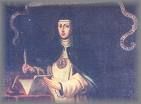
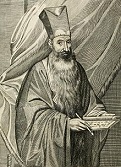


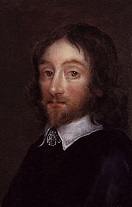





1643
On Jan. 20 Abel Tasman discovers Tonga, followed by the Fiji Islands,
almost wrecking on reefs in the NE part, then Vanua Levu and Cikobia
before making open sea and heading back and arriving at Batavia on June 15.
On Feb. 25 New Netherland gov.-gen. (since 1638) Willem Kieft (1597-1640) ignores advice from his Council of Twelve Men and orders the
Pavonia and Corlears Hook Massacre of 120 Indians incl. women and children on Feb. 25, 1643, resulting in
Kieft's (Wappinger) War (1643-5).
On Mar. 18 the Battle of New Ross sees the British under Thomas Butler, earl of Ormonde defeat the Irish rebels under
Thomas Preston, 1st Viscount Tara (1585-1655).
On Mar. 19 (Sun.) the Battle of Hopton Heath sees royalist
Spencer Compton, 2nd Earl of Northampton (b. 1601) charge too eagerly and get surrounded by parliamentary soldiers under
Sir John Gell (1593-1671) and Sir William Brereton (1604-61),
who offer him quarter, which he scorns as coming from such base rogues and rebels, after which he is KIA from a blow to his puffed-up head.
In Mar. 1 large royalist force from Newark under brainy William Cavendish, 1st Duke of Newcastle-upon-Tyne (1592-1676)
invades Lincolnshire and captures Grantham in a surprise attack, then march toward Boston, causing 1.5K Parliamentary troops under Lord Willoughby of Parham to unsuccessfully try to block them on Apr. 11
at the Battle of Ancaster Heath, after which Cavendish makes a surprise attack on Lord Willoughby's troops on
May 13 in Breton, killing 70 and taking 40 POWs, until Oliver Cromwell leads a cavalry charge that routs them, becoming his first independent action as a cavalry cmdr.
On Apr. 12 the leave-me-in-your-will-you're-Cadillac's-talking title of Duke of Hamilton
is created as the #1 peer of Scotland by Charles I for royalist James Hamilton, 1st Duke of Hamilton (1606-49); in
1711 after the Act of Union the duke of Hamilton is also created English duke of Branded, er, Brandon; meanwhile the new duke tries to mediate between Charles I and the British Parliament,
and when that fails, he refuses to take the Covenant, and is kicked out of Scotland, arriving in Oxford on Dec. 16, but he soon pisses-off the king, who sends him to Pendennis Castle next Jan.,
then St. Michael's Mount, where he stays until Lord Fairfax and his troops liberate him on Apr. 23, 1646 - these pesky Scots are ever a nuisance?
In Apr. former lord high adm. (1630-48) Algernon Percy, 10th Earl of Northumberland, 4th Baron Percy (1602-68)
heads a Parliamentary delegation that meets with Charles I in Oxford, but he won't budge, and after Northumberland returns to London, he becomes the target of war hawks, causing him to retire to
his estates at Petworth, while other "peace lords" join the king at Oxford, but in Sept. he returns to London and takes the Covenant, turning into a hawk when Scots start occupying his lands in N England.
Here comes the Sun King - pass the Pampers?
On May 14 sickly king (since May 14, 1610) Louis XIII (b. 1601) dies of TB, and his 4-y.-o. son
Louis XIV (the Great) (the Sun King) (1638-1715)
becomes Bourbon king #3 of France (until Sept. 1, 1715), with his mother Anne of Austria as regent, who falls to her knees and cries "My king and my son!";
she confirms Cardinal Mazarin as first minister; he is partial to mistresses, beginning with his Roman-born niece
Marie Mancini (1639-1715), and to white bechamel sauce, made by his chief steward
Louis de Bechamel, Marquis de Nointel (1630-1703),
and thinks of England as "a little garden full of sour weeds"; after Louis XIV grows up into a short man, he begins wearing a towering wig to appear tall, starting a fashion;
he continues mixing the Bourbon line with other brands, er, branches, with his brother Philip founding the House of Orleans, and his grandson Duke Philip of Anjou becoming Philip V of Spain
and founding the Spanish House of Bourbon.
On May 19 five days after Louis XIII's death, 25K Spanish invaders from the Netherlands led by Gen. Francisco de Melo (1597-1651)
living under an illusion of invicibility are defeated by a French citizen army of 23K led by 22-y.-o. Louis II de Bourbon, Duc d'Enghien (1621-86)
(prince of Conde in 1646), who uses cowboy tactics with his cavalry, combined with superior artillery against the unbeaten Spanish infantry at the
Battle of Rocroi, the last big battle of the Thirty Years' War, ending Spanish military ascendency in Europe and clearing
the way for French ascendency under Louis XIV; Louis II becomes a hero, and is made a prince in 1646, and later called the Great Conde; unpopular Spanish PM (since 1621)
Count-Duke Olivares becomes the fall guy, and retires to Toro, and is succeeded by his nephew
Luis Menendez de Haro y Sotomayor, 6th Marquis of Carpio, 3rd Duke of Olivares (1598-1661);
too bad, Spanish "Blue Nun" Maria Fernandez Coronel, Abbess of Agreda (1602-65)) gains influence over him, causing him to abolish the
function of valido, which put a PM in charge of all documents given to the king to sign, reducing his power greatly.
On July 15 (July 5 Old Style) Gov. John Winthrop records a sudden storm in Essex County, Mass. that was
"so violent for half an hour as it blew down multitudes of tres"; it may be the first tornado recorded in the U.S., although it might have only been a line squall.
On July 23-27 the Cavaliers led by Prince Rupert and his Devil Poodle take Bristol.
In July Anne Hutchinson (b. 1591), her mother and siblings and five of her children are massacred by Siwanoy Indians in East Chester, Pelham Bay, N.Y.;
only daughter Susannah survives because the Indians freak at her red hair, and raise her as an Indian until she is ransomed back years later;
Rev. Falwell, er, Gov. Winthrop calls her death "a special manifestation of divine justice"; in 1987 Mass. Gov. Michael Dukakis pardons her and revokes Winthrop's order of banishment.
On Aug. 11 after Charles I and Prince Rupert siege the last Roundhead bastion of Gloucester, a giant egg-shaped mortar brought from France by
English poet laureate William Davenant explodes on its first discharge opposite the castle at Gawdy Green (modern-day Brunswick Square), after which Gloucester is relieved in Sept.; in
1797 Samuel Arnold composes the poem Humpty Dumpty, with the lines:
"Humpty Dumpty sat on a wall,/ Humpty Dumpty had a great fall,/ Four-score Men and Four-score more,/ Could not make Humpty Dumpty where he was before."
On Aug. 16 the Parliamentary enemies of Charles I, led by the ailing John Pym (1583-1643) sign the
Solemn League and Covenant,
which ultimately does Charles I in, as it promises the Scots religious reforms if they aid Parliament, specifically "the preservation of the reformed religion in the Church of Scotland...
the reformation of religion in the kingdoms of England and Ireland, in doctrine, worship, disciple, and government, according to the Word of God, and the example of the best reformed churches";
the Westminster Assembly drafts the Westminster Confession of Faith, the first major Presbyterian statement of belief.
On Sept. 2-Oct. 12 the










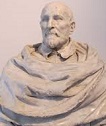
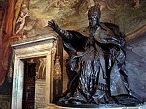
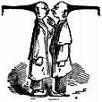
1644
On Jan. 25 the royalists (incl. soldiers sent from Ireland) under John Byron, 1st Baron Byron (1599-1652)
are routed by the Parliamentary forces under Sir Thomas Fairfax and Sir William Brereton at the Battle of Nantwich;
George Monck, 1st Duke of Albermarle (1608-70)
is taken POW and put in the Tower until 1647, when he convinces Parliament of his loyalty and is sent to Ireland to become gov. of Ulster; meanwhile in Jan.
James Butler, 12th Earl of Ormonde (1610-88) (later promoted to 1st duke of Ormonde ),
who had supported Thomas Wentworth since 1640 in his campaigns in Ireland is made lord lt. (viceroy) of Ireland (until 1650), going on to assist
Randal MacDonnell, 1st Marquess of Antrim (1609-83)
to send an Irish Confederate expedition led by Alasdair MacColla (1610-47)
into Scotland to help the Scottish royalists.
On Mar. 23 the Dutch send a punitive expedition to Cambodia over the destruction of their factory the year before.
On Mar. 31 after Duke Odoroardo defeats the papal forces in the Battle of Lagoscuro,
a peace is agreed to in Ferrara, ending Odoardo's excommunication, restoring his fiefdoms and permitting the grain shipments to Rome to resume so his
Roman creditors can be paid, ending the First War of Castro (begun 1641); the whole affair discredits the papacy as a military power.
In Mar. after France intervenes on Parma's side, the War of Castro (begun 1642) ends with the defeat and humiliation of Pope Urban VIII,
after which Parma forms an anti-papal league with Venice, Tuscany and Modena for self-protection.
In Mar. Suffolk-born Matthew Hopkins (1620-47)
overhears witches discussing their meetings with the Devil in Manningtree (near Colchester), Essex, and appoints himself (or gets Parliament to appoint him)
"witchfinder-general", getting around the prohibition of torture with sleep deprivation and making them hop around until they confess, also pricking them
looking for the Devil's mark that will not bleed, launching his 14-mo. career (ends 1647) in East Anglia along with asst.
John Stearne (1610-70),
going on to hang more people for witchcraft than in the previous cent., incl. 300 women.
Three strikes and the Roundheads are not out? Three strikes and the Cavaliers are not out?
On Apr. 11 the royalists are defeated at the Battle of Selby
by Parliamentary forces led by
Ferdinando Fairfax, 2nd Baron Fairfax of Cameron (1584-1648),
a longtime MP and gen. of the Parliamentarian forces in Yorkshire; on June 29 the royalists led by personally Charles I score a big V at the



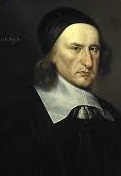
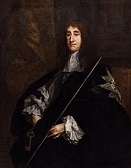



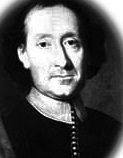
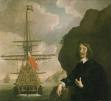
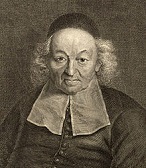



1645 The 70-year Maunder Minimum (period of low sunspot counts) begins (ends 1715); the Thames River freezes every winter, and there is famine throughout Europe and China, beginning a series of bad weather, poor harvests, and plagues worldwide; in 1645 the summer in England is excessively hot and dry, causing small animals and birds to suffer from heat-borne diseases; in 1645-6 Russia suffers droughts, plagues of locusts; in 1647- S Russia suffers early frosts and poor harvests, creating widespread food shortages; this year a great storm in Shanghai, China causes the sea to break the dikes, flooding the fields with salt water and destroying the rice crop; this year intense rains in Crete destroy crops and bldgs.; in Sept. a year-long rainstorm in Sicily destroys the winter harvest and seriously reduces the summer harvest; in winter 1645/6 Ukraine suffers a cruel winter filled with frosts and heavy snow, followed by heavy spring rains that make roads impassible, destroying the harvest and causing starvation among the Cossacks on the lower Dnieper River; in Aug. 1646 cold rainy weather causes wheat prices to reach record-setting levels, followed by bad harvests for five years as cattle die from murrain, with peak wheat prices in 1648-9; in fall 1646 a great drought begins, lasting through the spring; in 1646 a great storm strikes Holland and Denmark, killing 110K with floods; meanwhile in 1646 the sea breaks in at Dullar in Friesland and Zealand, drowning 100K in 300 villages, plus 10K in Dordrecht, Netherlands; in 1646 the Iberian Peninsula suffers a disastrous harvest; in 1646 a locust plague in Moldavia destroys the harvest, leaving not even one blade of grass, doing ditto in 1647 and 1648; in 1646 torrential rains in Turkey are followed by a drought in 1647, which destroy Istanbul's harvest surpluses and create a food shortage;in 1646-7 a super-cold winter stops a Mughal invasion of Afghanistan; in May 1647 the weather in S Spain turns cold, "even worse than the coldest January dry", resulting in the worst harvest of the cent.; in 1647 the harvest in France fails, causing even the royal court to suffer a food shortage, leading to the 1648-53 Fronde Rev. that kills 1M; in 1647 there is a famine in Crimea; in Apr.-Nov. 1648 it rains every day in Holland, causing crops to rot in the fields, after which 6 mo. of frost and snow cause the canals to freeze, stopping barge traffic; in 1648 bad weather ruins the harvest in S Italy, causing grain prices in Naples to quadruple; in 1648 heavy rains in Yucatan, Mexico result in a yellow fever plague, after which an extraordinary drought produces wildfires that destroy all remaining crops, leaving the ground sterile, killing almost half the pop. by 1656; in 1649 floods in England and France; in 1649-50 rain and wars cause famine in Scotland and N England, followed by plague in England and Ireland; in 1650-1 Scotland has its worst drought in 1K years, while Ireland suffers a major famine. On Jan. 10 Anglican archbishop of Canterbury (since 1633) William Laud (b. 1573) is beheaded by order of the Puritan-controlled Parliament under a bill of attainder. In Jan. peace talks at Uxbridge fail, and armistice ends, beginning the Great Scottish Rebellion; after Archibald Campbell, 8th Earl and 1st Marquess of Argyll (1607-61), gov. of Scotland sides with the English Parliament, Charles I holds Earl James Graham of Montrose back from leading a Scottish insurrection until Argyll begins invading England, resulting in Montrose's "year of miracles", as his outnumbered royalist army wins on Feb. 2 at the 2nd Battle of Inverlochy Castle (first in 1431), then takes Aberdeen, Brechin, and Dundee. In Feb. after winning a power struggle with his boss, Episcopalian gen. Edward Montagu, 2nd Earl of Manchester (1602-71), new English MP for Cambridge (until 1649) Oliver Cromwell (1599-1658) begins reorganizing Parliament's armies into the tight Puritan New Model Army, England's first prof. army, with officers selected by merit; Cromwell's Ironsides Regiment (from a nickname given him by the Royalists, alluding to Edmund Ironside) gives his whole army a nickname. In Feb. Edward Hyde is knighted and made a member of Charles I's privy council, then appointed chancellor of the exchequer in Mar. In Mar. Parliament appoints Algernon Percy, 10th earl of Northumberland as guardian of Charles I's two children Princess Elizabeth and the Duke of Gloucester (York), with talk about him becoming king if negotiations with Charles I fail, causing him to totally back the war party (Independents), although he balks at voting in favor of a bill of attainder against his old backer Archbishop Laud. On Apr. 3 after failing to pass the House of Lords on Dec. 9, the Self-Denying Ordinance is passed by the Long Parliament, prohibiting MPs from holding a military command, causing Ferdinando Fairfax to resign as gov. of York, the earl of Essex to resign as CIC of the Parliamentary army, and Sir William Waller to resign his military career; Oliver Cromwell, Sir Thomas Middleton, and Sir William Brereton are exempted from the ordinance; Ferdinando's son Thomas Fairfax, 3rd Lord Fairfax of Cameron (1612-71) becomes CIC of the Parliamentary army, with Oliver Cromwell as his lt. gen., who becomes the real boss; Waller, a Presbyterian, grows bitter and begins flopping to the royalist side. On May 2 after French marshal Turenne crosses the Rhine River with a refitted army in hopes of linking up with Tortensson, then chases the undermanned Bavarians under gen. Franz von Mercy deep into Wurtemburg, the Bavarians catch him looking the other way at the Battle of Mergentheim (Marienthal) (Herbsthausen), causing them to flee, becoming Turenne's first D; luckily French reinforcements arrive, and Turenne stages a comeback tour on Aug. 3 at the Second Battle of Nordlingen (Battle of Allerheim), his 12K troops defeating the 12K troops of Gen. Mercy (b. 1590) (with equal losses of 5K on each side) despite the cowboy Duc d'Enghien (is he the Great Conde yet?) almost losing it for them; Mercy is KIA; freaked Bavarian elector Maximilian I sends envoys to arrange a separate peace, causing French envoys to meet them next Jan. at the Congress of Munster (ends Jan. 30, 1648). On May 9 the royalists under the earl of Montrose and Alasdair MacColla win a V over the Covenanters under Sir John Hurry (Urry) at the Battle of Auldearn, seemingly guaranteeing Scotland for Charles I by the summer. On May 11 a relief column led by Col. Ralph Weldon (1606-76) arrives at Taunton, but they too get trapped, until an Ordinance for a Collection for Relief of Taunton is passed on May 24, after which more troops arrive on June 14, spared from the Battle of Naseby. On May 31 after Charles I sends them to divert Parliamentary forces under Gen. Thomas Fairfax (whom Charles I calls "the rebels' new brutish general") from his main base at Oxford, the royalist Cavaliers led by Prince Rupert win the Battle of Leicester, capturing the city; too bad, on June 14 Cromwell's New Model Army intercepts Charles I on his march back to Oxford, and wins a big V at the Battle of Naseby, where eye-on-fashion Charles I wears shining armor and rides a Flemish horse, contrasting with the drab Puritan army, which proceeds to kick his royalist army's butt by 1 p.m., with 1K royalists KIA and 6K taken POW, causing Prince Rupert to tell Charles I that the royalist cause is lost and urge him to conclude a peace with Parliament, causing Charles to flee to Wales; on July 10 the Parliamentarians win another big V at the Battle of Langport, breaking Charles I's military back; the royalists then lose Carlisle, Winchester, and Basingstoke. On July 12 (July 23 Old Style) tsar (since 1613) Michael I Romanov (b. 1596) dies, and his son Alexis I (1629-76) becomes Russian Romanov tsar #2 (until Jan. 29, 1676). In July after mending relations with the Indians with plenty of wampum, Adriaen Cornelissen van der Donck (1618-65) AKA "Jonkheer" (young gentleman) (first lawyer in North Am.) is granted 24K acres on the future site of Yonkers, N.Y. N of Manhattan near the junction of the Hudson and Nepperhan Rivers, going on to build his Colen Donck estate along with several mills; meanwhile the pop. of Amsterdam decides to remove dir.-gen. (since 1638) Willem Kieft, picking Peter Stuyvesant. In July witch-pricker (hunter) John Stearne (1610-70) tries 29 people for witchcraft in Chelmsford, getting 15-16 hanged; nine convicted of conjuring are reprieved. On Aug. 23 after reducing Bridgewater, eliminating the Dorsetshire Clubmen, and capturing Sherborne Castle, the New Model Army under Lord Fairfax begins the Second Siege of Bristol (ends Sept. 10). On Aug. 25 Edward Somerset, 2nd Marquess of Worcester, created earl of Glamorgan last year by Charles I signs a secret treaty with the Irish Roman Catholics in Kilkenny to supply military aid; too bad, after the Irish loyalists complain, Charles I repudiates it. On Aug. 31 after the Swedes under Count Hans von Konigsmark terrorize Saxony enough, elector Johann Georg I signs a 6-mo. armistice with them, granting them Leipzig, rights of free passage, and financial support; sad Saxony is out of the Thirty Years' War, and is kaput as a major Euro power. On Sept. 11 Prince Rupert surrenders Bristol to the Cromwellians under Thomas Fairfax, pissing-off Charles I, who fires him, causing Rupert to demand a court-martial, which acquits him, although he never fights for the !?!*? royalists again. On Sept. 13 the Battle of Philiphaugh sees the Parliamentarians under Scottish soldier David Leslie (1601-82) (later 1st Baron Newark) surprise and defeat the earl of Montrose, causing his heterogenous, badly disciplined army to dissolve, finishing the royalist cause in Scotland; Montrose decides to switch to guerrilla warfare. In Oct. Parliamentary soldier Henry Ireton (1611-51) (who was wounded and captured at Naseby) is elected to Parliament after escaping. On Nov. 12 Parliamentary CIC Thomas Fairfax arrives in London to applauding crowds, after which both houses of parliament present him thanks along with expensive jewels set with diamonds, plus money; meanwhile Charles I returns from Wales to Oxford, then chickens out and heads to Newark to gain the protection of the trusty Scots. In Nov. the Siege of Dunster Castle in Somerset by Parliamentary forces begins; it surrenders next Apr. The Turks begin fighting Venice for control of Crete (ends 1669) as part of a gen. plan to control the Mediterranean (which reaches fruition in 1715), starting the Fifth Venetian-Turkish (Cretan) War (of Candia) (ends 1569) by landing in W Crete - was it worth it? After a Bavarian-imperialist army is blown to pieces by the mobile artillery of the Swedes at the Battle of Jankow, the Torstensson War (begun 1645) ends with the Peace of Bromsebro (Brömsebro), whereby Denmark is stripped of its power by rival Sweden; big britches Axel Oxenstierna is created a count; burned-out Lennart Tortensson retires next year, and dies at age 48. The Dutch occupy St. Helena. Zheng Zhilong (1604-61) forms a pirate band in Formosa (Taiwan), which raids the SE China coast. Godavarma dies, and Veerarayira Varma (d. 1646) becomes ruler of Cochin. Dahomey king (since 1620) Dakodonou dies, and his nephew Aho Houegbadja (-1685) becomes king #3 of Dahomey in W Africa (until 1685), founding the capital city of Abomey (Agbome) ("middle of the ramparts") near Guedevi (modern-day pop. 90K). The town of Tarrytown, N.Y. (Dutch "tarwe" = wheat) in Westchester County, N.Y. 25 mi. N of midtown Manhattan (modern-day pop. 11.2K0 is first settled by Dutch farmers, later becoming the place where Maj. John Andre is arrested as a spy in 1780, the subject of Washington Irving's "The Legend of Sleepy Hollow", a favorite residence of rich John D. Rockefeller (1893) and Standard Oil Co. pres. John D. Archbold, and the site of the Tappan Zee Bridge, which carries the New York State Thruway to South Nyack, Rockland County, and Upstate N.Y. French nurse Jeanne Mance (1606-73) establishes Hotel-Dieu (Fr. "Hostel of God") de Montreal in Montreal, Canada, becoming the first hospital in North Am. A ship from Cambridge, Mass. defeats an Algerian ship in a naval encounter; James Fenimore Cooper later calls this the first Am. naval battle. The Iroquois drive the Algonquin-speaking Ottawa tribe from their homes in the upper Ottawa River of Canada, and they take refuge in Manitoulin Island in Lake Huron, from where they try to move to the S shore of Lake Superior, until the Sioux force them back; by next cent. they extend their territory to all of lower Michigan, parts of Ohio and Ill., and the Canadian side of Lake Huron. The city of Brooklyn (Dutch "Breuckelen" = marshland) on the East River at the SW end of Long Island in New Amsterdam (modern-day pop. 2.6M), named after the town of Breukelen near Utrecht is founded near the modern-day borough hall; on Jan. 1, 1898 it is merged into the City of New York as one of five boroughs, although as a city it becomes the 3rd most populous city in the U.S. after Los Angeles, Calif. and Chicago, Ill. Schwein, er, swine pens in the inner town of Leipzig are pulled down. Capuchin monks explore the Congo River - capuchino, bwana? The weekly Ordinarie Post-Tijdended (Regular Mail Times) is founded in Stockholm by Queen Christina and Chancellor Axel Oxenstierna, with all postmasters in Sweden required to submit news reports for the newspaper, which is posted on bulletin boards throughout the country; in 1791 Gustav III designates the Swedish Academy to pub the newspaper; in 1821 it merges with the Inrikes Tidningar (Domestic Times) to form the Post-och Inrikes Tidnigar (PoIT) (Post and Domestic Times). London scientists Robert Boyle et al. hold preliminary meetings of the Philosophical College, leading to the foundation of the Royal Society of London for Improving Natural Knowledge in 1662 after the Restoration. Italian-born composer Jean-Baptiste Lully (1632-87) becomes a violinist at the French court. Cardinal Mazarin summons a Venetian opera co. to Paris. Andre Le Notre (1613-1700 becomes the gardener of Louis XIV (until 1700), going on to build the park of the Versailles Palace, extending the Tuileries W to create the later site of the Champs-Elysees avenue and the Axe Historique (Voie Triopmphale). The 32-gun Constant Warwick, built by Peter Pett (1610-72) in Ratcliffe is launched, becoming the first English frigate in the English Royal Navy; originally built as a privateer for the earl of Warwick, the navy hires it in 1646 and buys it in 1649; it is captured by the French in 1691. Architecture: The Dalai Lama's Residence in Lhasa, Tibet is begun. Jacob van Campen (1595-1657) begins the Nieuwe Kerk (New Church) (finished in 1649), with a Renaissance tower designed by Lieven de Key (1560-1627), becoming the first church in Haarlem specifically built for Protestant services. Jacques Lemercier and Francois Mansart design the Baroque Val-de-Grace (Val-de-Grâce) Church in Paris, and on Apr. 1 Louis XIV lays the cornerstone; it is finished in 1667. Nonfiction: Leo Allatius (1586-1669), De Quorundam Graecorum Opinationibus; first Western accounts of a vyrkolakas, a combo between a werewolf and a vampire in Greek lore. Ismail Bouillaud (1605-94), Astronomia Philolaica; popularizes Kepler's elliptical orbits and assumes the inverse-square law for the first time; most important book on astronomy between Kepler and Newton? Hermann Busenbaum (1600-68), Medulla Theologiae Moralis, Facili ac Perspicua Methodo Resolvens Casus Conscientiae; textbook on Jesuit moral theology; a big hit, going through 200+ eds. by 1776, becoming the std. Roman Catholic textbook on moral theology for 200+ years. John Cotton (1585-1652), The Way of the Churches of Christ in New England. Sir Kenelm Digby, A Treatise on Bodies and of Man's Soul. Lord Herbert of Cherbury (1582-1648), De Causis Errorum. Thomas Fuller (1608-61), Good Thoughts in Bad Times; prayers and meditations. Marc Aurelio Severinus, Zootomia Democritaea; a treatise on comparative anatomy, recognizing the unity of the vertebrates, but claiming man as the basic archetype designed by God - green eyed lady, child of Nature, friend of man? Art: Jacob Jordaens (1593-1678), Wife of Candaules. Isaac van Ostade (1621-49), A Winter Scene. Rembrandt van Rijn (1606-69), The Rabbi; Young Girl at an Open Half-Door. David Teniers the Younger (1610-90), Tavern Scene. Diego Velazquez (1599-1660), King Philip IV on a Boar Hunt. Music: Francesco Paolo Sacrati, La Finta Pazza; the first opera performed in Paris. Heinrich Schutz (1585-1672), Die sieben Worte Christi am Kreuz (oratorio). Plays: Pierre Corneille (1606-84), Theodore, Vierge et Martyre (tragedy). Tristan l'Hermite (1601-55), La Morte de Crispe. Paul Scarron (1610-60), Jodolet (comedy). Poetry: Vitzentzos Kornaros, Rotokritos (Cretan epic poem). Novels: Pedro Calderon de la Barca (1600-81), El Gran Teatro del Mundo. Births: British Tory politician Sidney Godolphin, 1st Earl of Godolphin (d. 1712) on June 15 in Breage, Cornwall; of an ancient Cornish family. French essayist-moralist Jean de La Bruyere (Bruyère) (d. 1696) on Aug. 16 in Paris. French-Canadian explorer Louis Jolliet (Joliet) (d. 1700) on Sept. 21 in Beaupre (near Quebec City), Quebec. British pirate Capt. William Kidd (d. 1701) in Greenock, Scotland. English theologian John Mill (d. 1707) in Shap, Westmorland; educated at Queen's College, Oxford U. French alchemist (druggist) Nicholas Lemery (d. 1715). Deaths: French feminist writer Marie de Gournay (b. 1565). English statesman-historian Sir Richard Baker (b. 1568) on Feb. 18 in Fleet Prison London; in jail for his wife's debts. German gen. Count Georg Friedrich von Hohenlohe (b. 1569) on July 7 in Langenburg. English feminist poet Emilia Lanyer (b. 1569). English Anglican archbishop William Laud (b. 1573) on Jan. 10 (executed). Spanish poet-statesman Francisco Gomez Quevedo y Villegas (b. 1580) on Sept. 8 in Villanueva de los Infantes; dies poor and broken for not keeping his mouth shut. German postmaster (1615-28) Johann von den Birghden (b. 1582) on Mar. 4 in Frankfurt am Main. French chemist Jean Rey (b. 1582) in Le Bgue. Dutch jurist, statesman and father of internat. law Hugo Grotius (b. 1583). English Catholic founder Mary Ward (b. 1585). Spanish PM (1621-43) Gaspar de Guzman, Conde-Duque de Olivares (b. 1587) on July 22 in Toro. German gen. Franz von Mercy (b. 1590) on Aug. 3 near Nordlingen. Dutch navigator Anthony van Diemen (b. 1593). Russian tsar (1613-45) Michael I Romanov (b. 1596) on July 12 in Moscow. English MP (1624-45) William Strode (b. 1598) on Sept. 9; given a public funeral in Westminster Abbey by order of Parliament, then exhumed after the Restoration. Am. Mass. colonial leader Israel Stoughton (b. ?); returned to England in 1644, became an officer in the Parliamentary Army, was KIA, and bequeathed 300 acres in Dorchester, Mass. to Harvard College.

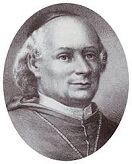





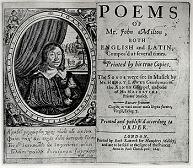
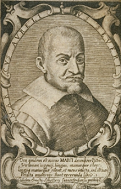

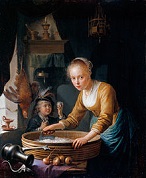

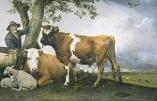
1646 On Mar. 28 James Butler, 1st duke of Ormonde signs a treaty with the Irish Confederates granting religious concessions et al., but their gen. assembly rejects it after archbishop Giovanni Battista Rinuccini (1592-1653), nuncio of Pope Innocent X talks them out of it, after which those who signed it are arrested and the truce with Ormonde is called off, moving in on his stronghold in Dublin. On Apr. 14 the Peace of Eilenberg renews the armistice between Sweden and Saxony. On May 5 Charles I disbands his army at Oxford and flees to Newark, surrendering to the Scottish Covenanters, after which his former enemy Alexander Leslie gives him refuge in Scotland (until Jan. 1647); on May 14 the royalist army in the @ surrenders; on June 25 Oxford surrenders to the Roundheads, and Prince James is taken POW and put under house arrest in London (until 1648); Charles I banishes Prince Rupert and his brother Maurice from England. On July 4 Veerararayira Varma dies, and Veera Kerala Varma IV (d. 1650) becomes ruler of Cochin in India (until 1650). On July 30 after Charles I surrenders to the Scottish army and orders it, the earl of Montrose disbands his army at the Haugh of Rattrary near Blairgowrie in Perthshire, then escapes to Norway, ending up in Paris next year; in Sept. Col. Thomas Blagge (1613-60) (father of Margaret Blagge, later known as Mrs. Godolphin) surrenders Wallingford Castle to gen. Sir Thomas Fairfax, but only after his king gives him permission, becoming the last royalist regiment to surrender; the Puritan army ransacks the religious community of Little Gidding in Huntingddonshire, founded by Nicholas Ferrar (1592-1637), who had created a "Protestant nunnery" there that was highly regarded by Charles I; Parliamentary commissioners present Charles I with the Newcastle Propositions, demanding acceptance of the Nat. Covenant, installation of a Presbyterian form of church govt., surrender of control of the armed forces for 20 years. On Sept. 11 Odoardo I (b. 1612) dies, and his eldest son Ranuccio II Farnese (1630-94) becomes duke #6 of Parma and Pacienza (until 1694), inheriting a heavy financial and diplomatic burden after all that Castro mess in 1641-4. The Swedes under gen. Carl Gustav Wrangel take Prague, then invade Bavaria and hook up with the French under field marshal Turenne, confusing Maximilian with Turenne's "le style indirect" until he quits the imperial alliance; meanwhile the duc d'Enghien captures Dunkirk, and succeeds his father Henry II as prince of Conde, becoming lord of Burgundy, Berry, and large parts of Lorraine, which alarms Cardinal Mazarin and causes them to become enemies. Edward Hyde falls out of favor with Charles I, and is sent to Jersey as one of the guardians of Prince Charles, who fled there from the Scilly Isles, and finally flees to France, living with his mother Henrietta Maria at St. Germain, and setting up a court which becomes a center of intrigue. The Great Elector of Brandenburg marries Louise, daughter of Frederick Henry of Orange. Edward Winslow (1595-1655) is sent by the govt. of Mass. to England to answer some charges against the colonists, and gets in good with Oliver Cromwell, extending his stay and never returning to Plymouth. Bond, James Bond, Pt. 3? The Eleutherian Adventurers, a group of English Puritans occupy the Bahamas, renaming their island Eleuthera (Gr. "freedom), founding the first permanent Euro settlement after Columbus' 1492 arrival wiped out the aboriginal Taino pop.; after settling Sayle's Island (New Providence), they end up living off salvaged goods from wrecks. The Cambodians cave-in to the Dutch punitive expedition. French missionary Isaac Jogues (b. 1607) returns to North Am. as a French ambassador to the Mohawks, and discovers Lake George; he concludes a peace treaty with them, goes to Quebec to plan a new permanent Indian mission, then is captured by a hostile faction of Mohawks, charged with sorcery and murdered near modern-day Auriesville, N.Y. English settlers found Ft. St. George (White Town) in Madras, India, giving them three centers in India along with Surat and Madras (Chennai). The Saugus Iron Works (originally Hammersmith) in Saugus, NE Mass. is founded, becoming the first integrated iron works in North Am., producing over 1 ton of iron a day, becoming one of the most technically advanced in the world, closing in 1670. London-born poet Abraham Cowley (1618-67), who sided with the royalist cause joins Queen Henrietta Maria in Paris, and becomes her cipher secy, returning to England as a spy in 1655 and getting caught and imprisoned, then landing on his feet after the Restoration, being granted a competency by one of Charles II's nobles. After learning their language, English-born clergyman John Eliot (1604-90), who was turned onto nonconformism by Thomas Hooker and came to British North Am. in 1631 begins preaching to Indians without an interpreter in Nonantum (Newton), Mass., becoming known as "the Apostle of the Indians". Cardinal Mazarin disbands the Musketeers (until 1657). English philosopher Thomas Hobbes becomes math tutor to the prince of Wales (later Charles II) in exile (until 1648). The French Royal Academy of Painting and Sculpture in Paris is founded by 12 artists, incl. Laurent de La Hyre. Dutch artist Paulus (Paul) Potter (1625-54) moves to Delft, joins the St. Luke Painters' Guild, and goes on to paint 175 canvasas and make 20 etchings by the time of his death at age 28, almost all of animals and landscapes, his #1 hit being The Bull. Architecture: The Church of St. Sulpice in Paris is founded by priest Jean-Jacques Olier (1608-57) on the ruins of the original 13th cent. Romanesque church. The Lustgarten (Pleasure Garden) on Museum Island in C Berlin near the Berlin City Palace (Berliner Stadtschloss) is built; in 1713 King Friedrich Wilhelm I turns it into a sand-covered parade ground; in 1790 Friedrich Wilhelm II turns it back into a park, which doesn't stop Napoleon from drilling his troops there in 1806. Inventions: The Japanese learn of the camera obscura from the Dutch. Science: Italian surgeon-anatomist Marco Aurelio Severino (1580-1656) pub. De Efficaci Medicina (3 vols.), becoming the first to describe refrigeration anaesthesia using snow-ice mixtures. Nonfiction: Sir Thomas Browne (1605-82), Pseudodoxia Epidemica, or, Enquiries into Very Many Received Tenets, and Commonly Presumed Truths; 6th ed. 1672; debunks legends in a Baconian manner. John Cotton (1584-1652), Spiritual Milk for Babes, Drawn Out of the Breasts of Both Testaments, Chiefly for the Spiritual Nourishment of Boston Babes in Either England; catechism for children; first children's book in Am.? Baltasar Gracian (1601-58), The Complete Gentleman (El Discreto); the ideal of the sophisticated man of the world. James Howell (1594-1666), Louis XIII. Marco Aurelio Severino (1580-1656), De Efficaci Medicina (3 vols.); first to describe refrigeration anaesthesia using snow-ice mixtures. Jeremy Taylor (1613-67), A Discourse Concerning Prayer. Bishop John Wilkins (1614-72), Ecclesiastes. Edward Winslow (1595-1655), Hypocrisie Unmasked. Art: Gerrit Dou (1613-75), Girl Chopping Onions. Jan van Goyen (1596-1656), Village Church in the Sand Dunes. Laurent de La Hyre (1606-56), Cornelia Refuses the Crown of the Ptolemies. Bartolome Esteban Murillo (1617-82), The Angel's Kitchen. Rembrandt van Rijn (1606-69), Adoration of the Shepherds. Music: Sir Elton John, The Tumbleweed Connection (album); contains Where Now, St. Peter?, the "blue canoe" song :) - just checking if you're awake? Plays: Jean Rotrou, Le Veritable Saint Genest (drama). Poetry: John Milton (1608-74), Poems of Mr. John Milton both English and Latin, Compos'd at Several Times; pub. by royalist Humphrey Moseley; rev. ed. pub. in 1673; incl. On the Morning of Christ's Nativity; also L'Allegro (The Merry Man) and Il Penseroso (The Serious Man), becoming the most famous companion poems in English lit.? James Shirley (1596-1666), Poems. Sir John Suckling (1609-42), Fragmenta Aurea. Henry Vaughan (1621-95), Poems. Births: French economist (Jansenist) Pierre Le Pesant, Sieur de Boisguillebert (Boisguilbert) (d. 1714) on Feb. 17 in Rouen; of an ancient noble Norman family allied to that of Pierre Corneille. French "The Thousand and One Nights" orientalist-archeologist Antoine Galland (d. 1715) on Apr. 4 in Rollot, Picardy. Danish-Norwegian king (1670-99) Christian V (d. 1699) on Apr. 15 in Flensburg; son of Frederick III and Sophie Amalie of Brunswick-Luneburg; husband (1667-) of Charlotte Amalie of Hesse-Cassel. French #1 Baroque architect Jules Hardouin-Mansart (Hardouin) (d. 1708) on Apr. 16 in Paris; grand-nephew and pupil of Francois Mansart (1598-1666). French botanist and Minim monk Charles Plumier (d. 1704) on Apr. 20 in Marseille; student of Joseph Pitton de Tournefort (1656-1708); namesake of genus Plumeria. German world's greatest genius (WGG) (philosopher, mathematician, scientist et al.) Baron Gottfried Wilhelm (von) Leibniz (d. 1716) on July 1 (June 21 Old Style) (7:15 p.m.) in Leipzig, Saxony; son of Freidrich Leibniz (1597-1652), prof. of moral philosophy at the U. of Leipzig, who leaves him a large personal library, which he starts mastering at age 7, mastering Latin by age 12; mother is Catharina Schmuck; educated at the U. of Leipzig, and U. of Altdorf. German Baroque "Adam and Eve" composer Johann Theile (d. 1724) on July 29. English portraitist Sir Godfrey Kneller (d. 1723) on Aug. 8 in Lubeck, Germany; educated in Amsterdam; emigrates to England in 1675. English astronomer royal #1 (1675). John Flamsteed (d. 1719) on Aug. 19 in Denby; educated at Derby Free School, and Jesus College, Cambridge U. French classical scholar Jean Hardouin (d. 1719) on Dec. 23 in Quimper, Brittany. Deaths: English-born Am. anti-Puritan atty.-writer Thomas Morton of Merry Mount (b. 1576). German composer Johann Stobaeus (b. 1580). Scottish theologian Alexander Henderson (b. 1583) on Aug. 19 in Edinburgh. English art collector Thomas Howard, 2nd earl of Arundel (b. 1585) on Oct. 4. English gen. Robert Devereux, 3rd earl of Essex (b. 1591) on Sept. 14. French martyr (St.) Isaac Jogues (b. 1607) near Auriesville, N.Y. (martyred); leaves Journal of St. Isaac Jogues. Italian duke of Parma and Piacenza (1622-46) Odoardo I Farnese (b. 1612) on Sept. 11. Chinese Prince of T'ang (b. ?).



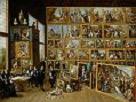

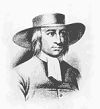






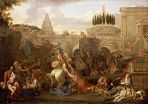


1647 There is a yellow fever epidemic in Barbados, characterized by victims bleeding from their eyes, nose, and mouth, and into their stomach, causing them to vomit partially-digested "wet coffee grounds" blood; later traced to monkeys in West Africa, vectored to man by mosquitoes, esp. Aedes (Aëdes) aegypti, and brought to the New World by African slaves - serves whitey right? On Jan. 30 after refusing to subscribe to the Solemn League and Covenant, Charles I is ransomed from the Scottish Calvinists by Parliament, and held at Holmby House; Parliament (which still has royalist members) votes to disband most of the army. On Mar. 14 the Treaty (Truce) of Ulm is signed by France, Sweden, and Bavaria; Bavarian elector Maximilian I is forced to renounce his alliance with HRE Ferdinand III and agree to remain neutral in the war in order to get the invading French-Swedish army to leave Bavaria, but in the fall he reneges, later causing a revenge mentality to insist on the breakup of the whole rotten *!?*! Holy Roman Empire; the electors of Mainz and Landgrave of Hesse withdraw from the war. The Apr. ed. of the newspaper Perfect Occurences of Every Daie Journall in Parliament in London pub. the first newspaper ad, hawking the book The Divine Right of Church Government. On May 11 Peter (Pieter) Stuyvesant (1592-1672) arrives in New Amsterdam to become dir.-gen. #7 of New Netherlands (until 1664), introducing tea to North Am. On May 26 Alse (Alice) (Achsah) Young (b. 1600), convicted of witchcraft in Windsor, Conn. is hanged in the Hartford, Conn. Meeting House Square, becoming the first recorded execution of a witch in New England - oh my God I feel like Sisyphus when a guy came along and offered me a beer break? On June 3 a Parliamentary army kidnaps Charles I, and on June 7 Oliver Cromwell and Charles I meet for the first time, and Charles blunders again, turning down the lenient terms. On June 19 James Butler, 1st duke of Ormone surrenders Dublin to the Parliamentarians under personal trainer, er, Col. Michael Jones (-1649), uttering the soundbyte "I prefer English rebels to Irish ones", and sails for England in Aug.; the Catholic lords of the Pale, who only want toleration for the Catholic religion split ranks with the native Irish, who want their ancient land system restored. In Sept. Cromwell sieges Cashel Castle in County Tipperary, Munster, and piles peat outside the walls to kill all 3K trapped inside. On Nov. 11 after Oliver Cromwell's army (which refused to disband) rescues him, he flees to the Isle of Wight; after the moderate Covenanter Scots get antsy about Cromwell, they switch to Charles I's side, becoming known as the Engagers, and he negotiates a secret agreement with them on Dec. 28 whereby they agree to help restore him to his Divine Right throne in exchange for his consent to the abolition of the Scottish episcopacy, starting the "Second English Civil War"; meanwhile in Dec. a final attempt by Parliament to negotiate with Charles I, led by Algernon Percy fails. Masaniello (Tommaso Aniello) (b. 1622) leads a revolt against the Spanish overlords of Naples (ends 1648), and is assassinated. Frederick Henry of Orange dies, and is succeeded by his son William II of Orange (1626-50), who goes on to become the father of William III of England. Thirty Years' War gen. (former bishop) Archduke Leopold Wilhelm of Austria (1614-62) (elder brother of HRE Ferdinand III) becomes gov. of the Low Countries (until 1656), where he becomes a great art patron and maintains a cool gallery in Brussels containing expensive masterworks, which is portrayed in a 1650 painting by David Teniers the Younger, whom he hires this year as the keeper. A revolt begins against Tsar Alexis I in Moscow. The Turks begin sieging Chandax (Heraklion) on Crete (ends 1669). The Mass. colony enacts the Ye Olde Deluder Satan Act, which requires every town of 50 or more families to set up a grammar (Latin) school. English Cavalier poet Robert Herrick (1591-1674), vicar of Dean Prior in Devonshire since 1629 is deprived of his living because of his royalist sympathies; he is reinstated in 1662 after the restoration. After having a vision on rainy Pendle Hill in Lancashire, claiming that "the Lord let me see in what places he had a great people to be gathered", leaving his hometown of Drayton-in-the-Clay in Sept. 1643 to travel through civil war-filled England, learning to listen to his "inner light" and reject rituals, church buildings, and age-sex qualifications for the religious ministry (giving the right to women and children), Leicestershire, England-born Puritan George Fox (1624-91) begins to speak publicly, founding the Religious Society of Friends (Quakers), who believe it possible to have a direct experience of Christ without the need for clergy, making fans of William Penn and Oliver Cromwell. Danforth's Plantation on the Sudbury River 20 mi. WSW of Boston, Mass. is founded, becoming known as Framingham by 1700. The U. of Bamberg is founded by Prince-bishop Melchior Otto Voit von Salzberg to teach Roman Catholic theology. The Dresden Academy of Arts in Germany is founded. The Anglican profs. of Oxford U. are dismissed. Pierre Corneille is elected to the French Academy. The Lutherans acknowledge the Calvinists as their co-religionists. Brother scientists Thomas Bartholin (1616-80) and Rasmus (Erasmus) Bartholin (1625-98) of the U. of Copenhagen define Anthropology as follows: "Anthropology, that is to say the science that treats of man, is divided ordinarily into Anatomy, which considers the body and the parts, and Psychology, which speaks of the soul." Architecture: 142m-tall Notre Dame de Strasbourg Cathedral in France is finished, becoming the world's tallest bldg. (until 1874). The Unter den Linden (Ger. "under the linden trees") in C Berlin begins as lime trees are planted on his bridle path between the Royal Palace and Tiergarten hunting park, later running from the City Palace (Berlinder Stadtschloss) to the Brandenburg Gate. Science: French astronomer Adrien Auzout (1622-91) proves that air has barometric pressure. Nonfiction: John Cotton (1584-1652), The Bloody Tenent Washed and Made White in the Blood of the Lamb; replay to pesky Roger Williams by a Puritan leader in Mass. Bay Colony. Thomas Fuller (1608-61), Better Thoughts in Worse Times. Sir Ferdinando Gorges (1566-1647), Briefe Narration of the Originall Undertakings of the Advancement of Plantations into the Parts of America. Baltasar Gracian (1601-58), The Art of Worldly Wisdom (Oraculo Manual y Arte de Prudencia); 300 aphorisms; "A beautiful woman should break her mirror early"; "At 20 a man is a peacock, at 30 a lion, at 40 a camel, at 50 a serpent, at 60 a dog, at 70 an ape, and at 80 nothing"; "He that can live alone resembles the brute beast in nothing, the sage in much, and God in everything". Johannes Hevelius (1611-87), Selenographia; first atlas of the moon's surface, plus star catalog. Thomas May, History of the Long Parliament. George Monck, 1st Duke of Albemarle (1608-70), Observations on Military and Political Affairs; written while imprisoned in the Tower. Art: Gianlorenzo Bernini (1598-1680), The Ecstasy of St. Theresa (1647-52) (sculpture) (Santa Maria della Vittoria, Rome); showing St. Teresa of Avila receiving a phallic golden shaft through the heart from an angel, causing her to have a holy orgasm? Charles Le Brun (1619-90), The Massacre of the Innocents. Peter Lely (1618-80), The Young Children of Charles I. Claude Lorrain (1600-82), The Mill. Adrien van Ostade (1610-85), Peasant Family in an Interior. Paulus Potter (1625-54), The Young Bull; life-size. Nicolas Poussin (1594-1665), Moses Rescued from the Waters. Rembrandt van Rijn (1606-69), Susannah and the Two Old Men. Plays: Francis Beaumont (1584-1616) and John Fletcher (1579-1625), Comedies and Tragedies (posth.); the first collected ed. of 24 of their plays. Jean Rotrou, Venceslas (drama). Poetry: Abraham Cowley, The Mistress, or Several Copies of Love Verses. Henry More (1614-87), Philosophical Poems; "compared his chief speculations and experiences". Births: German scientific illustrator Maria Sibylla Merian (d. 1717) on Apr. 2 in Frankfurt. German Wettin elector of Saxony (1680-91) ("the Saxonian Mars") marshal Johann Georg (John George) III (d. 1691) on June 20 in Dresden; only son of Johann Georg II (1613-80) and Magdalene Sybille of Brandenburg-Bayreuth; father of Johann George IV (1668-94) and Augustus II the Strong (1670-1733). French physicist Denis Papin (d. 1712) on Aug. 22 in Blois; educated at the U. of Angers. Am. British gov. of Mass. (1702-15) Joseph Dudley (d. 1720) on Sept. 23 in Roxbury, Mass.; son of Thomas Dudley (1576-1653); educated at Harvard College. French Huguenot scholar-critic Pierre Bayle (d. 1706) (pr. BEL) on Nov. 18 in Carla-le-Comte (Carla-Bayle) (near Pamiers); father is a Calvinist minister; becomes a Roman Catholic in 1669 at a Jesuit college, then 17 mo. later flops back to Calvinism, showing that he's thinking for himself? English Restoration composer Pelham Humphrey (Humfrey) (d. 1674) in London. Persian shah (1666-94) Suleiman (Sulayman) I (d. 1694); eldest son of Abbas II (1633-66). Deaths: Am. Narragansett Indian chief Canonicus (b. 1565). Am. Sir Walter Raleigh's wife (1591-) Bess Raleigh (b. 1565). English colonizer Sir Ferdinando Gorges (b. 1566). Dutch merchant Willem Usselincx (b. 1567); dies broke. Dutch poet-dramatist Pieter Hooft (b. 1581) on May 21 in The Hague. Dutch prince of Orange (1625-47) Frederick Henry (b. 1584) on Mar. 14 in The Hague. English-born Am. Conn. founder Thomas Hooker (b. 1588) on July 7 in Hartford, Conn. Dutch dir.-gen. of New Netherland (1638-47) William Kieft (b. 1597) on Sept. 17 near Swansea, Wales; dies in a shipwreck of the Princess Amelia from New Amsterdam en route to Amsterdam. Italian astronomer-mathematician Francesco Cavalieri (b. 1598) on Nov. 30 in Bologna. Italian physicist-mathematician Evangelista Torricelli (b. 1608) on Oct. 25 in Florence. English witchhunter-gen. Matthew Hopkins (b. 1620) on Aug. 14 in Manningtree, Essex (TB)?. Neapolitan patriot Masaniello (Tommaso Aniello) (b. 1622) on July 16 in Naples (assassinated).
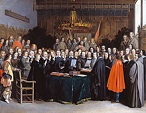

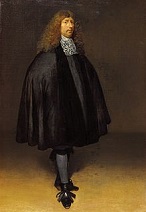







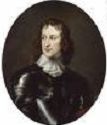


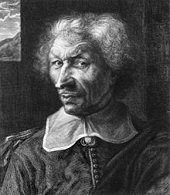


1648 Silly rabbi, kicks are for what? Where's the Da Vinci Code for this? Many Jews believe that this will be the year when their Messiah returns, and guess what, Qabbalistic ascetic miracle-performing future-predicting angel-communicating rabbi Sabbatai (Shabbethai) Zevi (1626-76) proclaims himself the Messiah in his hometown of Smyrna, Turkey by publicly pronouncing the unpronounceable Divine Name of God (the Tetragrammaton YHVH), and founds the Jewish Sabbatean Sect; too bad, the local rabbis don't go for it, esp. when he dares to eat non-kosher food, and get him banished from Smyrna in 1651 (1654?), after which he comes up with a document allegedly by Father Abraham naming him as the "true Messiah", who "will sit upon My throne", and tries to set up in Salonica, but is kicked out by its rabbis, and tries it again in Alexandria, Athens, Constantinople and Jerusalem, until he converts rich Jew Raphael Joseph Halabi of Aleppo, master of the mint in Cairo, and sets up in style in 1660-2. Don't you worry about what's on your mind or mine? In early Jan. the War of the Fronde (a children's sling used to hurl clods at coaches), an attempt by the French nobility to limit the royal power (like in England just across the Channel?) on the excuse of the minority of Louis XIV begins in France (ends 1653), based on a protest to the registration of royal tax edicts; on Jan. 15 a lit de justice (meeting of reps. to enforce an edict) raises taxes, and Parliament passes it after first breaking tradition and examining it, and presenting oral remonstrances on Apr. 7 calling upon Queen Anne to relieve the people from heavy taxes; on May 13 Parliament rebels against the queen, causing her to have its deputies and judges arrested, and on June 8 forbids it to meet, then flip-flops when they refuse to disband; on July 4 Parliament assumes legislative powers, breaking tradition. On Jan. 21 Md. landholder Margaret Brent (1601-71) appears before the assembly and stages an unsuccessful campaign to secure "place and voice" there, becoming the beginning of the Am. woman suffrage movement? On Jan. 30 the Spanish and Dutch officially recognize their tacit peace with the Treaty (Peace) of Munster (Münster), recognizing Dutch independence and ending their 80-year war; it is signed on May 15; the Dutch ignore their 1644 alliance with France that pledged to make no separate peace with Spain. On Feb. 28 Christian IV (b. 1577) dies, and his son Frederick III (1609-70) becomes king of Denmark and Norway, going on to introduce absolute monarchy, influenced by being a younger son brought up thinking he'd never be king then getting lucky? On Mar. 22 French physician Guy (Gui) Patin (1601-72) writes a letter about tea drinking in Paris, calling it "the impertinent novelty of the century", mentioning the new book by Dr. Philibert Morisset titled Ergo Thea Chinesium, Menti Confert (Does Chinese Tea Increase Mentality?), pub. in Paris, praising tea as a panacea, with the soundbyte: "One of our doctors, named Morisset, who is much more of a braggart than a skilful man... caused a thesis on tea to be published here. Everybody disapproved of it; there were some of our doctors who burned it, and protests were made to the dean for having approved the thesis. You will see it and laugh at it"; the work draws so much ridicule from physicians that nobody else tries it for years. In Mar. French gen. Turenne and Swedish gen. Wrangel unite their armies in Ansbach for an attack on Bavaria, moving S while pushing the imperial and Bavarian armies under Gen. Melander across the Danube River; on May 17 the Battle of Zusmarhausen near Augsburg is a D for Melander, who is KIA and his army crushed, falling back to Augsburg then beyond the Inn, while Gen. Piccolomini is recalled from Spanish service to lead the remaining imperial forces, holding the Swedes behind the Inn, allowing them to devastate Bavaria, after which they withdraw beyond the Lech with Piccolomini in pursuit; meanwhile a small army under Gen. Konigsmarck sent by Wrangel passes through the Upper Paltinate and invades Bohemia, devastating it, reaching Prague on July 2 and occupying the Kleine Seite quarter with the aid of a traitor former imperial officer, stealing a bunch of cool paintings by court portraitist Giuseppe Arcimboldo; after Karl Gustav (later Charles X of Sweden) arrives with reinforcements, they attempt to capture the rest of the city, but are held off by Jesuit-led students of Caroline U. until news of the Nov. Peace of Westphalia arrives. On Apr. 21 (night) Prince James dresses in drag to evade the guards and escapes confinement in London, assisted by Col. Bampfield, who helps him take a barge down the Thames to a waiting Dutch ship, and he arrives in the Low Countries on Apr. 23, staying in exile until 1660. On May 2 Wladyslaw IV (b. 1595) dies after keeping Poland out of the Thirty Years' War, and his Jesuit former cardinal (1646) half-brother Jan (John) II Casimir (Kazmierz) (1609-72) becomes king of the Polish-Lithuanian Commonwealth (until Sept. 16, 1668), soon facing troubles with the Cossacks and Swedes, starting with the Khmelnytsky Uprising in Ukraine (ends 1657), a Cossack reaction to Polish colonialism that results in Poles, Roman Catholics, and Jews being massacred; on May 26 the Battle of Korsun sees an army of Cossacks Crimean Tatars under Hetman Bohdan Khmelnytsky and Tugay Bey score a V against Polish-Lithuanian Commonwealth forces under Hetman Mikolaj Potocki and Hetman Marcin Kalinowski. On May 15 the wonderfully unholy Thirty Years' War (begun May 23, 1618) ends after 29 years, 11 months, 3 weeks, and 1 day, causing the pop. of Germany to drop from 17M in 1618 to 8M, and the pop. of the Holy Roman Empire from 21M to 13M, caused by holy war, holy famine, and holy plague?; meanwhile the pops. of other European countries have all grown (since 1500): Britain by 5M-7.5M; France by 12M-15M; Italy by 10M-12M; Low Countries by 2.5M-3.5M; Scandinavia by 2M-2.5M; Spain: by 6.5M-7.5M (not counting its Am. colonies). In May the Second English Civil War (ends 1649) begins when Charles I's Covenanter army in Scotland, joined by both the Protestant and Catholic Irish invades England; on May 8 the Battle of St. Fagans sees royalist insurgents in Wales heavily defeated; Prince Charles of England moves to Holland (where his sister Mary is married to the Prince of Orange) to support his daddy Charles I in his invasion of England, and takes "brown, beautiful, bold but insipid" (John Evelyn) Lucy Walter (1630-58) (former mistress of Roundhead officer Algernon Sidney) as his first mistress, later bearing him famous the bastard son and pretender James Scott, 1st Duke of Monmouth (1649-85); in the summer he leads a royalist fleet to Britain, which does little more than pull off a little piracy off the coast of Kent; the people in W Scotland who oppose Charles I become known as Whiggamores, later shortened to Whig. On June 15 Margaret Jones is hanged in Charlestown (Boston), Mass., becoming the 2nd person executed for witchcraft in New England. On July 8 James Hamilton, 1st Duke of Hamilton leads a large Scottish force into England in support of Charles I, and proves incompetent, letting his 24K troops wander over the country, making it easy for Oliver Cromwell, who on Aug. 17-20 in the Battle of Preston is in sole command for the first time ever, showing his brilliance and ruthlessness and winning a decisive V, then following through by cutting off the Scottish retreat, telling his troops "Take courage to do the work of the Lord", causing them to kill 20K Scots, and force Hamilton to surrender on Aug. 25 to gen. John Lambert (1619-84) at Uttoxeter in the West Midlands; Hamilton is beheaded next Mar. 9; the Siege of Colchester, led by Parliamentary gen. Thomas Fairfax ends on Aug. 28 with a really big D for Charles, who is about at the end of his royal rope. On Aug. 12 sultan (since 1640) Mad Ibrahim I (b. 1615) is deposed and murdered by a coup led by the grand mufti (who spreads the story that he was about to drown all 280 members of his harem), and buried beside Mad Mustafa I; he is succeeded by his 6-y.-o. son Mehmed IV Avji (1642-93), who becomes Ottoman sultan #19 (until Nov. 8, 1687). Peace between C's and P's - see this week's cover of Newsweek? On Oct. 24 after exit of the Protestant Dutch from the war causes Roman Catholic HRE Maximilian II to take up arms again, causing the Swedes under Gen. Wrangel and French under field marshal Turenne to march on the Danube and defeat him. On Oct. 24 (Sat.) the Thirty Years' War (begun May 23, 1618) between the Holy Roman (Catholic) Imperial Crown and the Protestant Princes of Europe ends with the compromise Peace of Westphalia (AKA Two Treaties of Munster and Osnabruck); Cardinal Mazarin's envoy Abel Servien, Marquis de Sable (Sablé) et de Boisdauphin (1593-1659) signs for France, becoming minister of state on his return to France next Apr., then becoming de facto gov. of France during Mazarin's exile during the Fronde; the map of Europe is redrawn; the Holy Roman Empire (HRE) is pretty much kaput, along with its dream of reestablishing the Roman Catholic Church in N Germany; "Spain yielded everything for which the Dutch contended"; France receives Metz, Toul, Verdun, Dreisach, and Pinerolo; Holland (except for the Spanish Netherlands) and, thanks to the diplomacy of Basel burgomaster Johann Rudolf Wettstein (1594-1666), the Swiss Confederation (despite being officially neutral during the war) are recognized as free repubs., and the Dutch Repub. of the United Provinces becomes one of the great continental powers, enjoying a golden age of art and lit., with Amsterdam becoming the financial thicker-than-a-soup-thinner-than-a-stew center of Europe; Prussia arrives as a power; the once-mighty Holy Roman Empire is reduced to about 300 independent principalities and 1.5K semi-sovereign bodies or individuals, and the diet is reduced to an assembly of ambassadors of the princely states; France and Spain remain at war until 1659, but peace is brought to most of distracted Europe, the religious warfare ushered in by the Reformation closes, and the modern principle of European nationality is established; the Early Modern Period in Europe begins, shifting the emphasis to the activities of nat. monarchies and their wars as well as to the rise of Serpent, er, Science; on Nov. 26 Pope Innocent X condemns it all in his bull Zelo Domus Dei; the territorial settlements remain practically undisturbed almost to the French Rev.; France gains the bishoprics of Meta, Toul, and Verdun, and a large part of Alsace in NE France (until 1790), beginning its land grab on the NE at the expense of the HRE for more than a cent.; the electorate of Brandenburg acquires Eastern Pomerania, the archbishopric of Magdeburg, the Cleves-Julich lands near the Rhine, and the duchy of East Prussia (formerly owned by the Teutonic Knights), and now it is free to expand both E and W over N Germany, making it the 900 lb. gorilla of the German empire, and causing a rivalry with Austria (which controls S Germany) which dominates European politics in the 18th cent.; Bavaria receives the Upper Palatinate (Nordgau) together with the Palatinate of the Rhine's electoral vote, and Charles I Louis (1617-80), son of Winter Queen Elizabeth of Bohemia (daughter of James I of England) regains his daddy Frederick V's Palatine electorship; Saxony acquires most of Lusatia from Austria; Sweden gains Western Pomerania and the bishoprics of Bremen and Verden at the mouth of the Elbe River, as well as Ingria from Russia, and Estonia and Livonia from Poland, giving her command of both shores of the Baltic, shutting Russia off from it, and vaulting Poland to the rank of a great European power; the town hall (built 1486-1512) of the city of Osnabruck (Osnabrück) in Lower Saxony (27 mi. NE of Munster) where the Peace of Westphalia is signed later becomes home to portraits of all the plenipotentiaries involved; the Alsatian town of Hagenau becomes more liberal towards its Jews under French control. New beds, new lobbies, deeper mattresses, crisper sheets, with wifi? The tail wags the dog in Bible paradise England? On Dec. 1 the Parliamentary army again seizes Charles I, and imprisons him at Carisbrooke Castle on the Isle of Man, where he agrees to abolish the English episcopacy, pleasing the the Independents in Cromwell's party who stand for wide tolerance in religious matters; Cromwell demands an end of allegiance to the king, and Parliament responds with a Declaration on Charles I's Misdeeds; the king offers some concessions to Parliament, which are rejected; on Dec. 6 Parliament's army, commanded by Col. Thomas Pride (-1658) stages Pride's Purge, arresting 45 loyalist MPs and keeping 186 others (mostly Presbyterians) out, expelling 75% of the members (all but the Independents), leaving the Rump (Purged) Parliament of about 90 members (of which only 50-60 regularly attend sessions, sitting on their rumps), representing only the army by this point, which operates sansa checks by the House of Lords and orders Charles I tried for treason. After the earl of Ormond concludes a peace with the Roman Catholic lords of the Pale granting them the right of free exercise of the Roman Catholic religion, Oliver Cromwell goes over the Old T and leads his army in, with Henry Ireton as his second-in-command - put that Wagner tape on? The revolt in Naples ends, and it is restored to Spanish rule. The Cossack Revolt devastates the Ukraine; hundreds of thousands of Jews are slaughtered - where's Taras Bulba? Persia recaptures Kandahar (Qandahar) from the Mughals, who had seized it in 1638. A revolt drives the Portuguese out of Muscat, Oman after 140 years (1508). The fortress of Klis is recaptured from the Ottomans by the Venetians. The aborigine pop. in the Caribbean, almost 1M at the time of Columbus, is now almost nil - the rib ain't back at McDonald's? The Iroquois defeat the Huron, who are driven into Canada. Prince Rupert takes command of that portion of the English fleet loyal to the king. A Dutch East India Co. ship is stranded in Table Bay, South Africa, and after rescue the crew gives glowing reports of the natural resources, causing a colonization expedition to be sent in 1652. Starting this year English political and military offenders as well as convicts are transported to the colonies to avoid execution. Mirrors and chandeliers begin to be manufactured in Murano, Italy (near Venice). The Academie Royale de Peinture et de Sculpture is founded in France, later becoming the Academie des Beaux-Arts. Aria and recitative become two distinct unities in airy restive op op opera. Architecture: The white-domed marble Taj Mahal at Agra, India (begun 1628) is completed, complete with four corner minarets. Jacob van Campen begins building the Amsterdam Town Hall in the Netherlands (finished 1655). The Kongelige Bibliothek (Royal Library) in Copenhagen is founded, becoming one of the largest libraries in the world, and largest in the Nordic countries, containing a copy of all works printed in Denmark in the 17th cent., and almost every Danish printed work back to 1482. Science: German-Dutch chemist Johann Rudolf Glauber (1604-68) discovers (makes) hydrochloric acid. Blaise Pascal proposes the concept of air pressure in barometers, having his brother-in-law carry one up a mountain and record its readings to show that higher altitudes have lower air pressure. Nonfiction: Anon., Emek Halachah; claims that the location of the Ark of the Covenant "shall not be revealed until the day of the coming of the Messiah son of David." Thomas Gage (1597-1656), The English-American His Travel by Sea and Land; or A New Survey of the West Indies; Roman Catholic-turned-Anglican draws on his years of travels to systematically expose Spanish-Am. military weaknesses and call for English military adventures to attack and loot them, becoming a big hit with Oliver Cromwell. Johann Baptista van Helmont (1579-1644), Ortus Medicinae, vel Opera et Opuscula Omnia (posth.); contains the concept of enzymes in digestion, and observes that plants gain weight from water and not the soil, establishing him as important in the transition from alchemy to chemistry, influencing Robert Boyle; English trans. 1662 as "Oriatrike; or, Physics Refined". John Lilburne (1614-57), The Foundation of Freedom, or An Agreement of the People. John Stearne (1610-70), A Confirmation and Discovery of Witchcraft. Bishop John Wilkins (1614-72), Mathematical Magic. Art: Gerard ter Borch (1617-81), Peace Congress of Munster (Münster); based on his personal attendance; contains 60 miniature portraits on copper incl. The Swearing of the Oath of Ratification of the Treaty of Munster (Münster), The Ratification of the Treaty of Munster (Münster), May 15, 1648. Bartholomeus van der Helst (1613-70), The Celebration of the Peace of Munster (Münster); Banquet of the Amsterdam Civic Guard in Celebration of the Peace of Munster (Münster). Claude Lorrain (1600-82), Embarcation of the Queen of Sheba. Nicolas Poussin (1594-1665), The Holy Family on the Steps; Eliezer and Rebecca; Landscape with Diogenes. Jusepe de Ribera (1591-1652), The Mystic Marriage of (the Holy Family with) St. Catherine. Rembrandt van Rijn (1606-69), The Pilgrims at Emmaus. Diego Velazquez (1599-1660), The Thread Spinners. Music: Heinrich Schutz (1585-1672), Musicalia ad Chorum Sacrum. Poetry: Robert Herrick (1591-1674), Hesperides, or the Works both Human and Divine of Robert Herrick; his magnum opus; 1.2K short poems, incl. To the Virgins, to Make Much of Time ("Gather ye rosebuds while ye may,/ Old time is still a-flying;/ And this same flower that smiles today,/ To-morrow will be dying"), and Corinna's Going a-Maying ("Come, let us goe, while we are in our prime;/ And take the harmlesse follie of the time./ We shall grow old apace, and die/ Before we know our liberty./ Our life is short; and our dayes run/ As fast away as do's the Sunne:/ And as a vapour, or a drop of raine/ Once lost, can ne'r be found againe"). Novels: Paul Scarron (1610-60), Le Roman Comique. Births: Dutch New Amsterdam settler Harmen Jansen Knickerbocker (d. 1721) on Mar. 18 in Friesland, Holland; one of the earliest New Amsterdam settlers; his name Knickerbocker (Dutch "marble baker") becomes generic for New York families descended from Dutch settlers. English St. Paul's Cathedral #1 woodcarver (Quaker) Grinling Gibbons (d. 1721) on Apr. 4 in Rotterdam, Netherlands; emigrates to England in 1667. French mystic Quietist leader Jeanne-Marie Bouvier de la Motte-Guyon (Madame Guyon) (d. 1717) on Apr. 13 in Montargis. Portuguese king (1683-1706) Pedro II (d. 1706) on Apr. 26 in Lisbon; brother of Alfonso VI (1643-83). Mexican feminist Sor Juana Ines de la Cruz (d. 1695) on Nov. 12. Scottish Covenanter minister Richard Cameron of Huddersfield (d. 1680) in Falkland, Fifeshire; founder of the Reformed Presbyterians. Norwegian poet ("Father of Modern Norwegian Poetry") Peter Dass (d. 1708) in Nord-Hero (Nord-Herö); son of a Scottish merchant from Dundee who moved to Bergen in 1630 and married a Norwegian girl; educated at the U. of Copenhagen. English Hoare's Bank founder Sir Richard Hoare (d. 1719) in London; grows up near Smithfield Market; starts out as a goldsmith; knighted in 1702; father of Henry "the Good" Hoare (1677-1725). English (Cornish) divine Humphrey Prideaux (d. 1724) in Padstow; educated at Westminster School and Oxford U. Deaths: Spanish Piarists founder St. Joseph Calasanctius (b. 1556) on Aug. 25 in Rome; canonized by Pope Clement XIII on July 16, 1767. Spanish dramatist Tirso de Molina (b. 1571) on Mar. 12 in Soria. German composer Johann Stadlmayr (b. 1575). Danish-Norwegian king (1588-1648) Christian IV (b. 1577) on Feb. 28 in Rosenborg Castle. English Deist philosopher Edward, 1st Baron Herbert of Cherbury (b. 1582). Scottish gen. Ferdinando, 2nd baron Fairfax of Camron (b. 1584). French philosopher-naturalist-mathematician Marin Mersenne (b. 1588) on Sept. 1. Dutch painter Daniel Mytens the Elder (b. 1590) in The Hague. Polish-Lithuanian king (1632-48) Wladyslaw IV Vasa (b. 1595) on May 20 in Merkine, Lithuania. French painter Louis Le Nain (b. 1593). French poet Vincent Voiture (b. 1598) on May 26; dies without pub. anything, but his verses and prose letters are posth. pub. by his nephew, having a big influence in lit. circles, helping Francoise de Malherbe reform French verse and Jean de Balzac reform French prose. Ottoman sultan #18 (1640-8) Ibrahim I the Mad (b. 1615) on Aug. 12 (murdered).






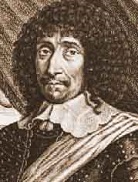





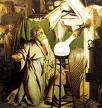
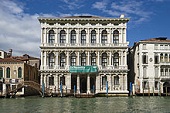
1649 England gets rid of a royal assahola and gets a non-royal assahola? On Jan. 4 after sending the House of Lords an ordinance creating a commission to try the king, only to have them reject it, Cromwell's Rump Parliament (House of Commons) declares itself the supreme power in the nation (effectively destroying the monarchy), and sets up the High Court of Justice in Westminster Hall to try Charles I, beginning on Jan. 20, with hatted Charles uttering the soundbyte: "I would know by what power I am called hither. I mean lawful. There are many unlawful authorities in the world. There are robbers and highwaymen"; Puritan reformer lawyer John Cooke (Cook) (1608-60) (known for being against using Latin in the courts, the death penalty except for murder and treason, imprisonment for debt, and the theory that heads of state are not above the law) bravely acts as the prosecutor of his own king, getting him convicted on Jan. 27 after a 7-day lube job of being a "tyrant, traitor, murderer and public enemy to the good people of this nation" after he three times refuses to plead; Algernon Percy leads a group in the House of Lords opposed to trying the king, causing him to be relieved of official duties in May; the treason is for enlisting French support in the English Civil War, and the trial witnesses the first modern legal argument against tyranny, based on the universal right to punish a tyrant?; quarterback Terry, er, Judge John Bradshaw (1602-59) pronounces the death sentence, and the death warrant is signed by 59 of 75 commissioners (judges), who later become known as the Regicides of Charles I (which label becomes very dangerous to their health in 1660); Oliver Cromwell utters the soundbyte that the execution of Charles I "'twas a cruel necessity"; the whole spectacle is fueled by the apocalyptic Fifth Monarchists, led by Puritan soldier Thomas Harrison (1606-60) (son of the mayor of Newcastle-under-Lyme, and cmdr. of the escort bringing kingy to London in Jan.), who believe that Jesus Christ is due to arrive in or around the upcoming big year of 1666 to bring the End Times like it says in the Bible book of Revelation; the king's children Prince Henry and Princess Elizabeth share their father's captivity and witness his last speeches, while his wife Henrietta Maria escaped to France in 1644, followed by his son Prince Charles in 1646, and his son Prince James in 1648, causing the homebody king (wife, kids, dogs, horses) to write to his queen "There was never man so alone as I"; on Jan. 30 (Sat.) (Jan. 20 Old Style) (noon) 5'4" Charles I (b. 1600) (a bitter cold day causing him to wear two shirts so he won't shiver and be accused of quaking with fear) drinks some claret and eats some bread, then is walked out of the first story window of the magnificent Banqueting Hall in Whitehall onto a raised platform so everybody can see, then is beheaded lying down after giving the Last Speech of Charles I, with the soundbyte: "I go from a corruptible to an incorruptible crown, where no disturbance in the world can be", after which a large groan comes up from the crowd; king-killing England and Wales are proclaimed a Commonwealth (Republic), shocking the Euros and the Scots, causing the Scottish parliament to immediately proclaim Prince Charles as Charles II, and he signs the Covenant to please them; Oliver Cromwell has Charles I's head resewn to his body; Gen. Thomas Fairfax resigns as Parliamentary army CIC after calling the trial rigged; Cook's asst. Isaac Dorislaus (b. 1595), who assisted in preparing the high treason charges while on a diplomatic errand to the estates-gen. of Holland is murdered on May 10 in The Hague by royalist refugees. On Jan. 5 the French king, royal family and ministers flee to Rueil Castle (owned by Cardinal Richelieu's niece the duchess of Aiguillon) while concentrating troops to siege Paris; the Great Conde is assisted by Caesar (César), Duc de Choiseul, Comte du Plessis-Praslin (1602-75), whose cook invents the sugar-almond confection praline; meanwhile parliament develops its own supply lines in and out of the city; on Mar. 11 the Treaty (Peace) of Rueil allows the king to return to Paris while the parliament goes to St. Germain; meanwhile provincial unrest is aided by the revolt of the princes, led by the Great Conde, who gains control of the govt. and fights the Frondeurs in Paris, but his brother the prince de Conti and his brother-in-law the duc de Longueville support the Frondeurs, causing him to switch sides next year after the truce; Cardinal Mazarin is forced to retire from the court, first to Bruhl, then to Sedan. On Jan. 17 James Butler, 1st duke of Ormonde, finding that the papal nuncio in Ireland had been expelled last Sept., returns from exile in Paris with the English queen and prince of Wales and concludes a peace with the Irish Confederates guaranteeing free exercise of their religion (but no more), then after Charles I is executed he proclaims his son Charles II and becomes cmdr. of the Irish Confederate armies along with English royalist troops landed from France. From Jan. 30 of this year until May 29, 1660 no more patents are issued in England because of the wear your crummy crownwell, er, Cromwell regime. Millennium Fever generates a new crop of holy commies? In Jan. Diggers founder Gerrard Winstanley (1609-76) pub. The True Levellers Standard Advanced; the Christian communist Levellers ("all men are created equal") (leveling real property) and Diggers (favorite name of their opponents) peak in England this year; too bad, in Apr. a Digger site on St. George's Hill in Weybridge (near Cobham, Surry) pisses-off the authorities, who sic New Model Army cmdr. Sir Thomas Fairfax on them, but after checking them ut he lets them along, pissing-off the lord of the manor Francis Drake (not the one 50 years earlier), who sends gangs to attack and beat them, then gets them railroaded on Ranter (sexual libertine) charges, after which they give up in Aug. and leave, then set up shop a short distance away in Little Heath, pissing-off the local lord of the manor Parson John Platt, who gets them hounded out next Apr., and by 1651 they are kaput. You got to change your evil ways, baby? On Feb. 5 Charles II, Prince of Wales (in exile at The Hague) is proclaimed king in Edinburgh, with the provision that he take the Covenant; the Irish proclaim him king and attack the small Parliamentary force in Ireland, trying to recapture Dublin; David Leslie switches sides and becomes the CIC of Charles II's Scottish armies, while Alexander Leslie, who also switches to the royalists steps down as CIC because of age and infirmity, but continues fighting - the original Find! with the Leslie twins? On Feb. 19 the Second Battle of Guararapes in Jaboatao dos Guararapes in Pernambuco, EC Brazil (founded on May 4, 1593) is a V for the Portuguese over the Dutch, who loses 1,045 casualties vs. only 245 for the Portuguese, convincing the Dutch to get out of Brazil., staying until 1654 then signing a treaty in 1661, leading to the creation of the Brazilian army. On Mar. 16 after waiting until the Huron defenders are away, 1.2K Iroquois capture the Huron village and Catholic mission in St. Ignace near modern-day Tay, Ont., torturing Jesuit Father (St.) Jean de Brebeuf (Brébeuf) (b. 1593) and his colleague (St.) Gabriel Lalemant (b. 1610) to death; the Iroquois defeat the Tobacco Nation; Brebeauf and Lalemant are canonized in 1930. On Mar. 17 the Rump Parliament abolishes the House of Lords and the kingship, destroys the royal crown and robes, and creates an executive council to be appointed annually by Parliament; toleration is granted to all except Catholics and Episcopalians; the second mass migration from the British Isles to the New World begins as thousands of wealthy royalist cavaliers and their indentured servants migrate from S England (Kent to Devon) to Va.; Puritan exiles from Va. in turn settle in Providence, Md.; too bad, by killing one king, another, his son Charles II sprouts up, safe in exile, trying to get support to make a comeback, however, despite sending their condolences, no Euro king will send him a single soldier, throwing him into the arms of the Scots, and the earl of Montrose, now in Paris, rallies an army and prepared to invade Scotland, but most of his troops are lost in a storm, and when he finally arrives, he is unable to rouse the clans. On Apr. 11 Jewish converso Tomas Trevino de Sobremonte (b. ?) is burned at the stake in Mexico City for practicing "the dead law of Moses". On Apr. 21 after William Claiborne uses the English Civil War and religion as a pretext to seize his beloved Kent Island from Md., only to be ousted in 1646, the Md. assembly passes the Maryland Toleration Act, professing a belief in the Holy Trinity, granting freedom to all Roman Catholics and Protestants, and providing the death penalty for blasphemy. In May the Third Agreement of the People is passed after the Levellers propose that armed forces should be raised strictly by local divisions, and officered by men elected locally; only the generals are to be appointed by Parliament. On Aug. 2 the Battle of Rathmines near Dublin sees the royalist army of James Butler, 1st duke of Ormonde routed by the Parliamentarians, causing Butler to build a line of fortified towns across Ireland in an attempt to stop Cromwell, who lands in Dublin in Aug. with 10K men, sieges Drogheda (home of the Irish parliament) on Sept. 3-11 and captures its garrison of 2K men, committing the Lenthall Massacre of 4K soldiers, civilians and priests, then scores another V on Oct. 2-11 at the Battle (Sack) of Wexford, killing 2K and committing more atrocities; he then implements the Cromwellian Settlement (ends 1652), evicting non-Protestant landowners E of the Shannon River and replacing them with Protestants (incl. his own men), selling Irish POWs into slavery in Barbados, where they intermarry with African women, creating the (future heavyweight boxing champs?) Black Irish; by next summer only isolated pockets of resistance remain in Ireland; Cromwell leaves Henry Ireton and Edmund Ludlow to finish the war, and they go on to deprive Irish Catholics of their political rights and confiscate and divide Irish land among Parliamentary soldiers, while banishing Catholic and Loyalist landowners to Clint Eastwood, er, Connacht (W Ireland). On Sept. 2 the Second War of Castro begins when Pope Innocent X accuses Duke Ranuccio II Farnese of murdering Cardinal Cristoforo Giarda (b. 1595) near Monterosi en route to become bishop of Castro (really it was because he reneged on paying the Roman creditors of his father), and seiges Castro for 2 mo., then razes it to the ground and crushes the troops of Parma near Bologna, seizing the whole fiefdom to pay the creditors, after which Ranuccio unsuccessfully tries to get it back by buying it. On Sept. 24 the Nuremberg Peace Banquet is hosted by future Swedish king Count Palatinate Karl Gustav of Zweibrücken in Nuremberg City Hall to celebrate the end of the Thirty Years' War. Who can turn the world on with his smile? He dug his own grave but the jury dug him out? On Oct. 20 "Free-Born" John Lilburne (1614-57), a Leveler who defends the liberties of all Englishmen, Cromwellians and royalists, and tried to save the king from being executed is saved from the gallows "by the power of the Lord and the integrity of his jury who are judge of law as well as fact" after he is arrested for pleading to spare the life of Charles I, and a jury tells the authorities to let him go free, becoming the first instance of floccinaucinihilipilification, er, jury nullification, the right of a jury to judge the justice of the law itself and to proclaim themselves the highest authority after getting in possession of all the facts of a case (a right the judge and prosecutor want to go away?); Lilburne gets off the same way in 1653, and ends up becoming a Quaker, becoming an inspiration to the U.S. Founding Fathers; too bad that by the 20th cent. the U.S. legal establishment regularly tries to keep juries from knowing about this power they have in order to railroad political prisoners? The Portuguese win a naval V over the Dutch off the coast of Brazil. Virginia and the Barbados declare for Charles II, causing Parliament to forbid them to carry on external trade except with ships owned or licensed by the Commonwealth. The Holy Roman Empire establishes a standing army in Austria. Injo dies, and next year Hyojong (-1659) becomes Yi king of Korea (until 1659). There is a major earthquake in Edo, Japan. John Milton is appointed foreign secy. of the English Commonwealth; English becomes the official language of all legal documents in Britain in place of Latin - a last slap to them papists? Royalist poet laureate Sir William Davenant leads an expedition to colonize Va., but is captured by the Puritans in the English Channel and sentenced to death, then put in the Tower (until 1652). Free enterprise in England receives state support. The Spanish viceroy of South Am. grants the reducciones (Jesuit frontier settlements) virtual independence. English Baptists Ebenezer Cartwright and Joanna Cartwright write from Amsterdam, calling for Parliament to lift the ban on Jews in England, from which they had been expelled since the days of Edward I Longshanks (1290). Official inventories list the late Charles I as owning 139 stud horses and 37 brood mares. Cossack leader Semyon Ivanovich Dezhnev explores Siberia and Alaska for Russia; Cossack Mikhail Stadukhin explores the Lena and Kolyma Rivers in Siberia. The English Repub. under Cromwell bans elaborate church music, thereby stimulating secular music composition? The Society for the Propagation of the Gospel Among the Indians in New England is created by the English Parliament; Am. clergyman John Eliot obtains their backing to found 16 settlements for converted Indians, which are broken up by King Philip's War in 1675. The enemies of Cardinal Mazarin pub. a phony ed. of Nostradamus' prophecies, dated 1568, contain two added quatrains aimed at him. Architecture: Baldassarre Longhena (1598-1682) begins building Ca' Rezzonico, in Venice on the Grand Canal, which is not completed until after his 1682 death; it is followed in 1659 by Ca' Pesaro, which is completed in 1710 by Gian Antonio Gaspari. Science: Nonfiction: Paolo Casati (1617-1707), Vacuum Proscriptum; states that Nature abhors a vacuum - think of those royal shoulders with no 'ead? Isbrand de Diemerbrock, De Peste; study of the plague by a Dutch physician. Rene Descartes (1596-1650), Les Passions de l'Ame. Edward Herbert (1582-1648), Life of Henry VIII (posth.). James Howell (1594-1666), A Perfect Description of the Country of Scotland. Johann Heinrich Hottinger (1620-67), Thesaurus Philologicus seu Clavis Scripturae (Zurich); 3rd ed. 1669. John Lilburne (1614-57), An Agreement for the Free People of England. John Milton (1608-74), The Tenure of Kings and Magistrates; response to the Presbyterians, arguing for the execution of Charles I; Eikonoklastes; response to the book Eikon Basilike: The Portraiture of His Sacred Majesty in His Solitudes and Sufferings, an alleged autobio. of Charles I written by his chaplain John Gauden and pub. on the day of his death, which portrays him as a martyred saint, and goes through 60 printings within a year. Robert Montagu, Lord Mandeville, Travels (1649-54); first Grand Tour diary? Alexander Ross (1590-1654) (tr.), The Alcoran of Mahomet, Translated out of Arabique; first English trans. of the Quran, based on a 1647 French trans. by Andre du Ryer. ? Rushworth, Rushworth's Collections; record of the Parliamentary battles leading up to the English Civil War. Henry Tuberville, The Douay Catechism. Johann Vogel, Meditationes Emblematicae de Restaurata Pace Germaniae; contains an illustration of a camel passing through the eye of a needle to show the folly of the Peace of Westphalia. Bishop John Wilkins (1614-72), A Discourse Concerning the Beauty of Providence. Edward Winslow (1595-1655), Glorious Progress of the Gospell Amongst the Indians in New England - ask your son about it later when the smoke clears? Art: Ferdinand Bol (1616-80), The Regents of the Leper Hospital (Town Hall, Amsterdam). Nicolas Poussin (1594-1665), Landscape with Polyphemus; Vision of St. Paul; painted for Paul Scarron. Jacob van Ruisdael (1628-82), The Banks of a River. Gerard ter Borch (1617-81), Portrait of Philip IV of Spain. Music: Francesco Cavalli (1602-76), Giasone (Jason) (opera) (Teatro San Cassiano, Venice) (Jan. 5); about Jason and the Golden Fleece; "single most popular opera of the 17th century." Johann Cruger (1598-1662), Geistliche Kirchenmelodien; hymns. Plays: William Cavendish, 1st Duke of Newcastle-upon-Tyle (1592-1676), The Country Captain (AKA Captain Underwit); The Varietie. Andreas Gryphius (1616-64), Carolus Stuardus; German tragedy about Charles I. Richard Lovelace (1618-58), To Lucasta, Going Beyond the Seas; To Althea, From Prison; To Lucasta, Going to the Warres; "Stone walls do not a prison make, nor iron bars a cage"; "I could not love thee, dear, so much, Lov'd I not honour more". Poetry: Anon., Lachrymae Musarum; collection of elegies to mourn Henry Hastings, who died right after the execution of Charles I, showing the inside of Royalist culture. Friedrich von Spee (1591-1635), Trutz-Nachtigall (posth.). Novels: Madeleine de Scudery (1607-1701) and Georges de Scudery (1601-67), Artamene (Artamène), ou le Grand Cyrus (10 vols.) (1649-53) (13,095 pages, 2.1M words; longest novel in French lit. until ?). Births: English "I Will Always Give Thanks" organist-composer John Blow (d. 1708) on Feb. 23 in North Collingham, Nottinghamshire; teacher of William Croft and Henry Purcell. Italian violin maker Girolamo Amati (Hieronymus II) (d. 1740) on Feb. 26 in Cremona; son of Nicolo Amati (1596-1684); fails to keep the quality up to the level of Antonio Stradivari, after which the family goes out of biz. English physician Sir John Floyer (d. 1734) on Mar. 3 in Hints, Staffordshire; educated at Oxford U. Am. college administrator Elihu Yale (d. 1721) on Apr. 5 near Boston, Mass; of Welsh descent; namesake of Yale U. English pretender James Scott (Crofts), 1st Duke of Monmouth (d. 1685) on Apr. 9 in Rotterdam; illegitimate (legitimate via secret marriage?) son of Charles II and Lucy Walter. English Popish Plot liar Anglican priest Titus Oates (d. 1705) on Sept. 15 in Oakham; born into a family of Anabaptist clergymen; educated at Gonville and Caius College and St. John's College, Cambridge U. Deaths: Dutch painter Jacob Molijn (b. 1574). German scholar Caspar Schoppe (b. 1576) on Nov. 19 in Padua, Italy; "A man of a restless spirit and a malicious pen." (Izaak Walton) Italian Jesuit missionary-scholar Giulio Alenio (b. 1582) on June 10 in Yanping, China. Bohemian defenestrated nobleman Jaroslav Borzita of Martinice (b. 1582) on Nov. 21. Flemish painter David Teniers the Elder (b. 1582). Chinese Roman Catholic missionaries Francesco Sambiaso (b. 1582) and Julio Aleni (b. 1582) (executed). Scottish author-poet William Drummond of Hawthornden (b. 1585) on Dec. 4. English-born Mass. Bay Colony gov. John Winthrop (b. 1588) on Mar. 26 in Boston, Mass.; dies almost penniless. French Jesuit missionary Jean de Brebeuf (b. 1593) on Mar. 16 in St. Ignace (Waubaushene) (near Tay, Ont., Canada) (martyred); canonized on June 29, 1930 by Pope Pius XI. English king (1625-49) Charles I (b. 1600) on Jan. 30 in Whitehall, London (beheaded): "Never make a defense or an apology until you are accused." Puritan divine Thomas Shepard (b. 1605) on Aug. 25 (tonsilitis). Scottish royalist gen. James Hamilton, 1st duke of Hamilton (b. 1606) on Mar. 9 (beheaded). French Jesuit missionary Gabriel Lalemant (b. 1610) on Mar. 17 in St. Ignace (Waubaushene) (near Tay, Ont., Canada). (martyred); canonized on June 29, 1930 by Pope Pius XI. English poet Richard Crashaw (b. 1613). Dutch painter Isaac von Ostade (b. 1621) on Oct. 16 in Haarlem.